‘Train beats plane on key domestic routes’
‘Majority’ of popular domestic air trips could be completed by train more quickly and cheaply, new Campaign for Better Transport report reveals
The majority of the most popular domestic and near Europe flights can be completed more quickly and cheaply by rail, a new report from Campaign for Better Transport has found. Plane speaking: moving journeys from air to rail, compared the top 23 domestic and UK to Europe flights which all have a direct rail equivalent on cost, journey time and carbon emissions, and revealed that 70% were quicker or the same by rail once airport processing times were added to flight times. Furthermore, over half (57%) of routes were cheaper or no more expensive by rail. Aviation makes a significant
OZZY’S NEW HOME
The centrepiece to last year’s Commonwealth Games - Ozzy the bull - has been officially unveiled in his new home on the station concourse at Birmingham New Street. It’s nearly a year since Ozzy - then known as the Raging Bullendeared himself to millions across the globe when he formed the climax of the Birmingham 2022 Opening Ceremony alongside 50 women chain makers to tell the story of the West Midlands’ industrial past. Ozzy was pictured this week with many of the original cast members.

Concerns over future of rural buses
New report reveals ‘historic low’ 04
contribution to the UK’s greenhouse gas emissions. The government’s strategy for achieving net zero aviation hinges on technological advancements, which are unlikely to make a difference soon enough. But Campaign for Better Transport says that switching just a quarter of the domestic flights featured in the report to rail would save 171,377 tonnes of carbon: the equivalent of
taking 117,900 cars off the road.
Silviya Barrett, from Campaign for Better Transport, said: “Traveling by rail within the UK and to the near continent is much more environmentally friendly than flying but also, as our report proves, in many cases cheaper, faster and more economically productive. Yet people simply aren’t aware that this is the case. To help incentivise train travel more and reduce carbon emissions from transport, we need to see government policies which ensure rail is always the easier and cheaper option so that more people can choose the train over the plane.”
NORMAN BAKER: PAGE 14
rail’
10
Welsh minister urges more focus on buses
Closing ticket offices creates challenges
16
Alex Warner warns against closures
EVENTS
The Great Transport Debate
24
Event will take a cross-modal view
PassengerTransport is taking its annual summer break. There will be no edition on August 11. The next edition of the magazine will come out on August 25.
ISSUE 294 28 JULY 2023 NEWS, VIEWS AND ANALYSIS FOR A SECTOR ON THE MOVE
“People simply aren’t aware that this is the case”
Silviya Barrett
‘Bus is better climate bet than
NET ZERO NEWS COMMENT
SUMMER BREAK
Transport requires new boldness, not retreat

20 A DVANCING UPTAKE OF MAAS ACROSS E UROPE UnderthehelmofUITP,the IP4MaaSprojectsoughttoadvance theuptakeofMobilityasaService (MaaS)schemesinEurope,by analysingandtestingexisting MaaStechnologiesandsolutions, andassessingthem.
Robert Jack
 Managing Editor
Managing Editor
There was an interesting juxtaposition on the front of The Times on Monday. The lead story declared ‘Tory retreat from green policies to woo voters’ alongside a large photograph of staff and holidaymakers fleeing wildfires in Rhodes. It reflects the already mixed messages from the government on reducing transport’s contribution to greenhouse gas emissions. Sometimes it’s about making public transport and active travel the natural first choice, other times it’s about not changing the way we live and “guilt-free” flying.
Labour’s failure to win last week’s by-election in Uxbridge was blamed on London mayor Sadiq Khan’s roll-out of the Ultra Low Emission Zone to the capital’s outer boroughs. It reminds us of the perils of asking people to change their behaviour, with former prime minister Boris Johnson - who backed the central London ULEZ when he was mayor - now calling it an “odious, unjustified tax on drivers”. But when the ULEZ has been extended next month and places like Uxbridge start enjoying cleaner air, how many will demand its reversal?
As Norman Baker points out (pages 14-15), government policy on aviation is also inconsistent with the urgency of the climate crisis. Starting on May 23, France banned short-haul between locations that are possible in less than two-and-a-half hours by train. The French are also cracking down on the use of private jets for short journeys. The UK and its public transport sector need similar boldness.
PASSENGER TRANSPORT
editorial@passengertransport.co.uk
forename.surname@ passengertransport.co.uk
EDITORIAL editorial@passengertransport.co.uk
ADVERTISING ads@passengertransport.co.uk SUBSCRIPTIONS subs@passengertransport.co.uk
14
F LIGHTS OF FANCY ARE FANNING THE FLA M ES Aviationisarealclimatechange problem. Norman Baker writes: “TheClimateChangeCommitteeis right.Weneedtoflyless.Domestically, weshouldbeswitchingpassengers fromairtorail,asisnowhappeningin otherEuropeancountries.”
18 WAR ON THE M OTORIST
- W HEN DO W E START? Withinappropriatepoliciesand imminentclimatedisaster,weshould bepromotingpassengertransportlike neverbefore,writes Nick Richardson “Therereallyisn’tacasefor perpetuatingcardependency;nowis thetimetotakeastanceagainstit.”
23
D O L ABOUR’S RAIL POLICIES M AKE SENSE?
OurWhitehallinsiderimagineswhat’s goingoninsidethemindsofthe mandarinsatGreatMinsterHouse, homeoftheDfT:“Labour’sposition islittlemorethanpoliticalposturing, althoughItotallyunderstandthe politicalfactorsthataredrivingthis.”
ORGANISATION PAGE ALBUM 5,8 AlexanderDennis 8,12 AvantiWestCoast 7 ChilternRailways 9 CountyCouncilsNetwork 4 CPT(UK) 11 EastCoastBuses 8 EdinburghBusTours 8 EPMBusSolutions 12 Eurostar 9 HS2Ltd 9,27 Kinchbus 11 Libertybus 11 LNER 7 Lothian 8 LothianCountry 8 Lumo 9 McGill’sBusGroup 8 Mellor 11 MTRUK 13 NetworkRail 13 OmnibusSolutions 12 OperatorofLastResort 7 RAIB 9 RailwayIndustryAssociation 6 RMT 9 ShielBuses 8 SYSTRA 4 TransportFocus 5 TransportforLondon 5,9 TransportScotland 3 TransportforWales 10 trenolab 13 Trentbarton 11 UniteUnion 8 Vectare 12 VelocitiGroup 12 Warrington’sOwnBuses 8
Telephone: 020 3950 8000
&
Jack
Andrew Garnett
Writer Rhodri Clark
Chris Cheek, Andrew Garnett, Robert Jack OFFICE CONTACT DETAILS Passenger Transport Publishing Ltd PO Box 5496, Westbury BA13 9BX, UNITED KINGDOM Telephone (all enquiries): 020 3950 8000
Managing Editor
Publisher Robert
Deputy Editor
Contributing
Directors
ACCOUNTS
Passenger Transport is only available by subscription. Subscription rates per year; UK £140 (despatch by Royal Mail post); Worldwide (airmail) £280 The editor welcomes written contributions and photographs, which should be sent to the above address. All rights reserved. No part of this publication may be reproduced in whole or in part without the publisher’s written permission. Printed by Cambrian Printers Ltd, Stephens & George Print Group, Goat Mill Road, Dowlaid, Merthyr Tydfil CF48 3TD © Passenger Transport Publishing Ltd 2023 ISSN 2046-3278 SUBSCRIPTIONS HOTLINE 020 3950 8000 HAVE YOUR SAY Contact us with your news, views and opinion at: editorial@passengertransport.co.uk PASSENGER TRANSPORT PO Box 5496, Westbury BA13 9BX 020 3950 8000 editorial@passengertransport.co.uk
REGULARS NEWS 03 NET ZERO 10 INNOVATION & TECH 12 COMMENT 14 GRUMBLES 23 CAREERS 26 DIVERSIONS 28
accounts@passengertransport.co.uk
IN THIS ISSUE
CONTENTS 02 | 28 July 2023 www.passengertransport.co.uk
DfT pauses bus retrofit funding amid doubts
Department investigates variable performance but Transport Scotland backs technology and continues to fund conversions. Rhodri Clark reports
CLEAN AIR
The DfT has defended pausing England’s bus retrofitting programme while it investigates variable performance. Faced with the same evidence on performance, Scotland is continuing to fund conversions to bring old vehicles into line with newer emissions standards - and says recent research shows the technology contributes significantly to cleaner air.
The DfT paused its funding for further retrofitting of buses in April after evidence emerged that the technology may not be delivering the expected reductions in nitrogen oxide emissions. It is investigating the issue and talking to retrofit suppliers about possible causes and solutions.
The situation has caused further delay to the introduction of Greater Manchester’s Clean Air Zone, as well as delaying bus conversions for various areas of England. So far, the DfT has provided nearly £170m to Greater Manchester to help reduce nitrogen dioxide levels, of which approximately £150m was spent on retrofitting 1,153 buses before the programme was paused.
A DfT spokeswoman said: “We work closely with local councils to help them improve air quality, including with using technology to help improve bus emissions.”
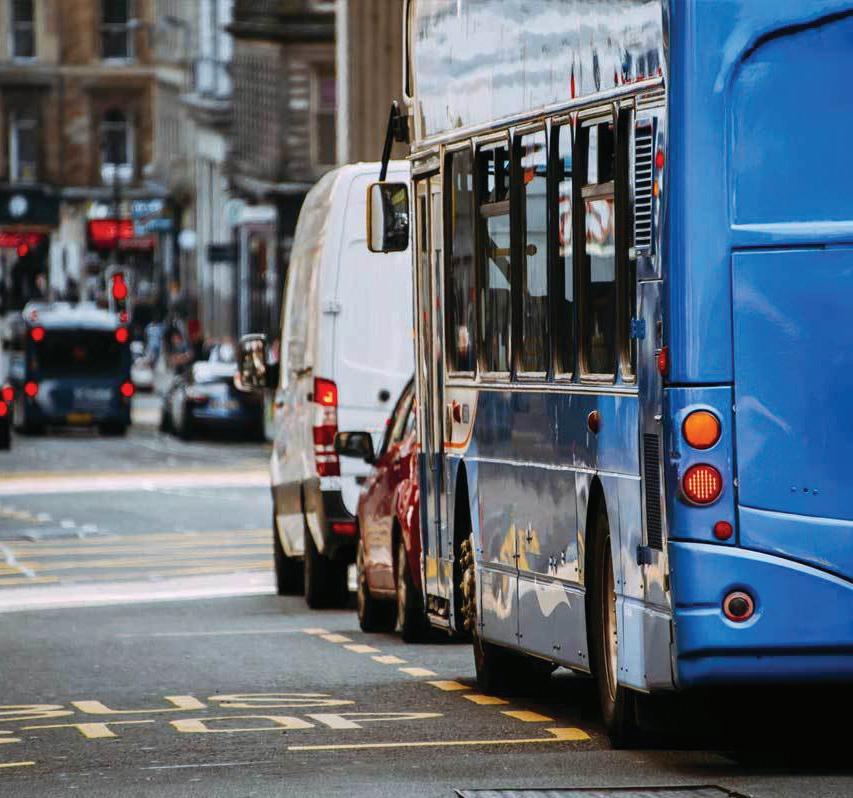
The DfT had always intended to undertake in-service monitoring to understand the effectiveness of retrofits funded
by the UK Government. “This was accelerated when issues identified in Scotland suggested that retrofitted buses may not be having the anticipated impact on real world NOx emissions,” said the DfT. NOx (nitrogen oxides) refers to nitrogen dioxide (NO2) and nitric oxide, both of which are produced when fossil fuels are combusted.
“Evidence has shown variability in the performance of the retrofit technology, and the government has taken a decision to pause
further funding whilst further investigation is carried out,” said the Department.
Transport Scotland told Passenger Transport last week that it was continuing to fund retrofitting through its Bus Emissions Abatement Retrofit (BEAR) programme. “Recent research shows that exhaust emission retrofits fitted under the BEAR programme do generate a significant improvement in vehicle emissions (NOx and particulates) and will therefore be having a
direct and positive effect on urban air quality compared with non-retrofitted vehicles,” said a Transport Scotland spokesman.
“BEAR retrofitting, along with other transport initiatives, has helped to improve air quality in some our most polluted streets ahead of the wider enforcement of LEZs [Low Emission Zones]. BEAR retrofit buses are subject to monitoring and evaluation to ensure that satisfactory in-service performance is achieved as part of the conditions of award.”
After receiving Scotland’s defence of retrofitting, Passenger Transport asked the DfT whether it had over-reacted to retrofit under-performance which was only marginal in the context of the overall programme, and whether the effect of its on-going pause would be a reduction in total DfT retrofit funding, because more old buses would be replaced with new ones over time.
The DfT responded: “It would be premature to make a final decision on future funding of retrofit ahead of the results of that investigation.
“Bus retrofit is one of a number of measures used by local authorities to improve air quality in cities across England. The NO2 programme works closely with local authorities to agree specific measures appropriate to their circumstances. Government remains committed to working closely with programme local authorities to achieve compliance with legal NO2 limits in the shortest possible time.”
As the investigation has proceeded, the DfT has shared information and data on bus retrofitting with Greater Manchester so that the city region can factor them into its analysis. “We are continuing to engage closely with them on this issue,” said the DfT.
ROUND-UP NEWS www.passengertransport.co.uk 28 July 2023 | 03
A bus in Glasgow. Transport Scotland is continuing to fund retrofitting through its Bus Emissions Abatement Retrofit (BEAR) programme
“The government has taken a decision to pause further funding whist further investigation is carried out” Department for Transport
Concerns raised over future of rural buses
New report finds services at a ‘historic low’ and reveals urban locations received two-thirds of government Bus Service Improvement Plan funding
FUNDING
A new report by The County Councils Network (CCN) has found that a substantial one in every four bus services disappeared in county and rural regions between 2010 and 2022.
The decline in vehicle miles surpassed the decline witnessed in London and the former metropolitan council areas covering cities and large towns. It suggests that the way in which Bus Service Improvement Plan funding was distributed has only exacerbated that trend in recent years.
The State of County Buses: Recovering Services Post-Pandemic, was produced by consultancy SYSTRA. Its analysis of Department for Transport data has found that between 2010-22, vehicle miles reduced by 26.5% in CCN areas.
The impact of the Covid-19 pandemic only made things worse, with vehicle miles dropping by 14.4% in 2021-22 compared to 2019. As a result, passenger numbers suffered a significant blow, with rural and county areas experiencing the most severe decline of 44%. In 2022, there were 344 million fewer journeys compared to 2010, marking a historic low for bus use.
The report highlights the traditional role of local authorities in funding replacements when commercial services are withdrawn. However, SYSTRA’s analysis exposed a concerning reality - many councils in rural
and county areas are facing a £420m (50.7%) shortfall in their local transport budgets. As a consequence, the number of council-supported miles in county areas plummeted drastically by nearly 60%, from 140 million miles annually in 2010 to a mere 58 million miles in 2022.
Commercial operators have also contributed to the decline by increasingly withdrawing services since the onset of the pandemic.
As measured in miles, the number of commercial services dropped by 15.6% since 2019, accounting for a decrease of 51.2 million miles.
Furthermore, the CCN raises concerns about the allocation of Bus Service Improvement Plan funding. The report found that BSIP cash largely went to areas with the smallest patronage decline. For instance, the former metropolitan council areas, which saw a 7.4% drop in passenger numbers up to 2019, received £739m, representing 67% of the total funding. In contrast, county areas that experienced a 16% decline received no funding in the first round but received £40m in the second round.
CCN said the lack of transparency in the decision-
making process that determined BSIP funding allocation has left many councils puzzled about the criteria. The report recommends that future bus funding initiatives should establish clear criteria to bring more clarity and fairness to the process.
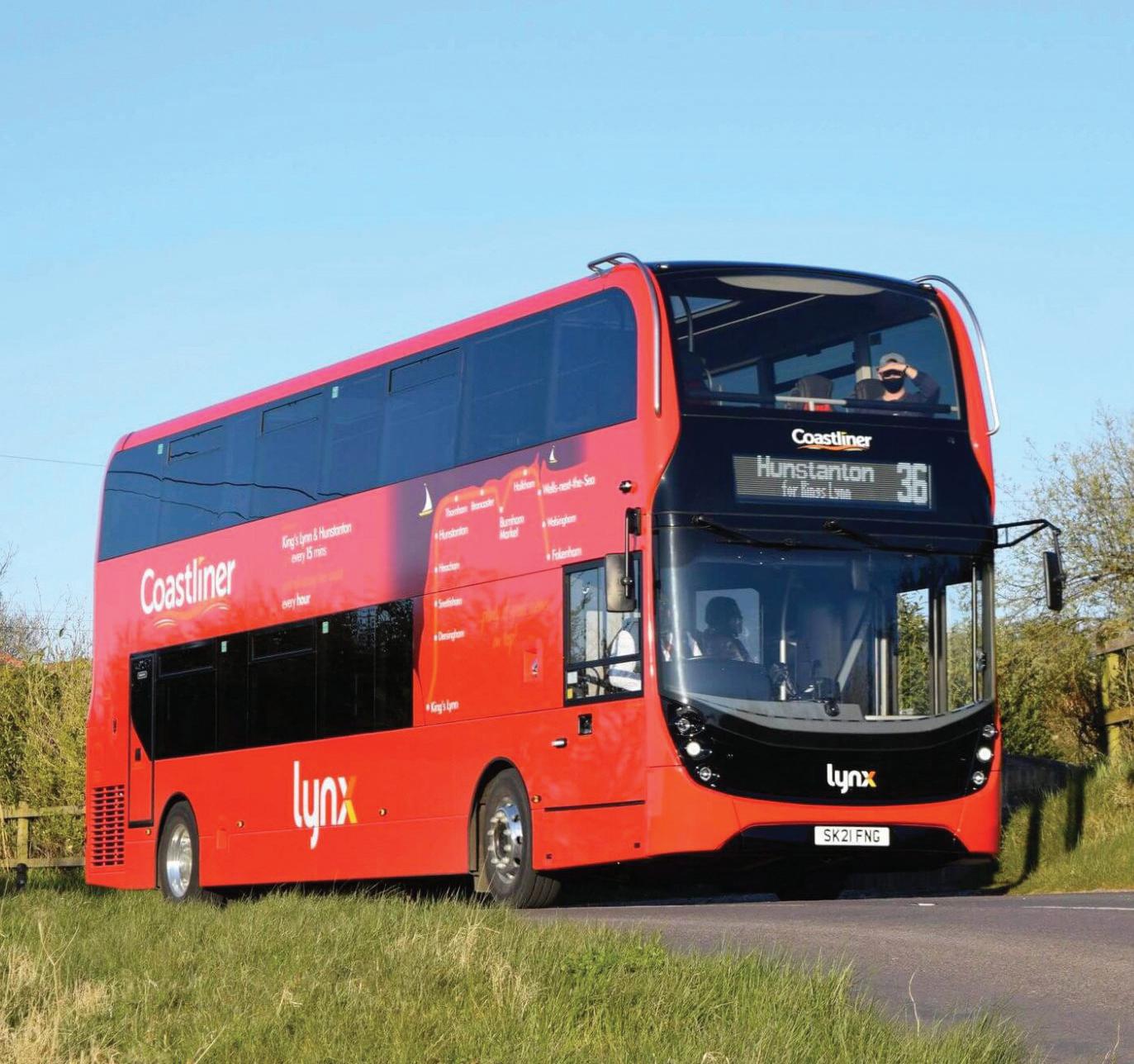
To address the steep decline in county and rural areas, the report also urges the implementation of a comprehensive ‘County Bus Strategy’. Additionally, it proposes the introduction of a direct revenue stream for buses and the permanent adoption of the capped £2 fare scheme.
“We had high hopes for the government’s National Bus Strategy, especially as the support for services during the pandemic was comprehensive,” said Stephen Giles-Medhurst, CCN’s transport spokesperson. “Many county areas were left feeling let down with their funding allocations, with the majority of funds being directed to the places that arguably needed the least help.
“As their bids for the funding showed, councils have serious ambitions when it comes to improving and modernising their bus services. But it is increasingly likely that reversing the decline in passengers is a challenge to picked up by a future government, and today’s report sets out a number of recommendations to transform local services. Failure to act will keep buses in county areas in a state of managed decline, with consequences for our residents.”
The Department for Transport refuted CCN’s claims. “This report only focuses on just one part of the £3.5bn we’ve put into buses since March 2020,” said a spokesperson. “Our new Bus Service Improvement Plan funding will be focused on areas that didn’t receive support under the original scheme.”
NEWS ROUND-UP 04 | 28 July 2023 www.passengertransport.co.uk
CCN pressed for a County Bus Strategy to help revitalise rural bus services
“Failure to act will keep buses in county areas in a state of managed decline”
Hiron advocates ‘fair and equitable’ payment
ALBUM chair wants to end arguments over reimbursement
CONCESSIONARY FARES
Reimbursement for the England National Concessionary Travel Scheme (ENCTS) must be fair and equitable.
That was the message from bus industry entrepreneur Bill Hiron in his role as chair of the ALBUM grouping of ‘non-aligned’ independent and municipal bus operators.
In a statement issued ahead of the government’s planned review of the ENCTS scheme, Hiron confirmed that ALBUM will work with the Department for Transport on the review and said that he wants to see a scheme that adequately reimburses operators for lost revenue.
Hiron added that he also hoped that a way could be found to give incentives to both operators and local authorities to grow this
important market.
“The very local nature of bus services - particularly those provided by the SME sector that ALBUM represents - means that the reimbursement must take account of local circumstances,” said Hiron.
“We do not believe that a nationally-negotiated reimbursement rate could take account of those essential local factors. It is, however, clear that local authorities need adequate resources to reimburse operators and that reimbursement levels should be based on a strong set of principles that can be set nationally.”
However, Hiron said ALBUM members had no view on whether spending by local authorities on concessionary fares should be funded nationally, locally or by a mix of the two.
“We believe that local authority budgets need to consider increases in industry costs and
Transport Focus probes free travel
Loss of services now a greater concern than Covid-19
More than a third of older and disabled concessionary bus pass holders say they are using buses less than before the pandemic, new research by Transport Focus has found.
Of the 2,500 people probed by the watchdog, those that said they were using the bus less reported they were going out less overall (27%). Of those
IN BRIEF
SUPERLOOP CONSULTATION
concessionary fare usage and, therefore, the costs of proper reimbursement,” he said. “We should never be in a position where reimbursement levels are scaled back to fit locally determined budgets.”
Hiron welcomed the pragmatic approach taken by both the government and local authorities in maintaining pre-Covid concessionary fare payments in order to support the industry.
“As we continue to move out of those challenging times, we want also to move away from old arguments about reimbursement,” he added.
“A constructive relationship between bus operators and local authorities is essential for mobility in every area, and concessionary fares are part of that. Where reimbursement rates are too low, the risk to the survival of routes and services is clear - it benefits no one if concessions are provided on services that no longer exist.”
Transport for London is seeking public feedback on the next phase of its planned ‘Superloop’ orbital bus network. It claims the new SL2 (Walthamstow Central to North Woolwich), SL3 (Thamesmead to Bromley) and SL5 (Bromley to Croydon) services will be “a significant addition to the bus network in south and east London, providing additional bus capacity in busy locations and encouraging more sustainable journeys”.
MORE ON SUPERLOOP
Transport for London will make enhancements to two Superloop services from August 19. The SL7 (formerly Route X26) between Heathrow and West Croydon will double in frequency so that buses run every 15 minutes instead of every 30. The SL8 (formerly Route 607) between Uxbridge and White City will see its timetable extended so that buses run earlier and later than currently. The route is also the first route to carry the Superloop branding.
SILVERTOWN BIKE BUS
who have not returned to the bus, around three in 10 (31%) said they are travelling less because services have been cut or have become less reliable and in some cases cancelled at the last minute. However, only 7% said they were now worried about catching Covid-19 on a bus, although for these people it still represented a barrier to their return.
For people who have not returned to using the bus more than 12 months ago, the top factor that would increase their bus use was better service frequency (55%), followed by the bus going to more destinations (48%).
Despite some frustrations about being unable to use their passes in the morning rush hour, 7% of those questioned whose use of bus has increased over the last year, said this is due to using England’s £2 flat rate fare scheme before 9.30am.
Transport for London has launched a consultation setting out its proposals to allow cyclists to use the new cross-Thames Silvertown Tunnel. It has said its preferred option is a new bespoke bus shuttle service for cyclists. The shuttle bus could operate as a timetabled service starting with six buses per hour, with the possibility to grow the service in future in response to demand. Drop off and pick-up locations would be integrated with existing cycle infrastructure. The service would be reserved for cyclists, with pedestrians directed to use the expanded range of bus routes using the new tunnel.
www.passengertransport.co.uk 28 July 2023 | 05
“A constructive relationship between bus operators and local authorities is essential”
Industry warns of crisis without new orders
Railway Industry Association claims that unless action is taken now on planned rolling stock enhancements, thousands of jobs will be at risk
INVESTMENT
A new report released by the Railway Industry Association (RIA) has raised concerns about the future of the rolling stock industry in the UK, warning that thousands of jobs could be at risk if action is not taken promptly.
The report, The UK Rolling Stock Industry – Making 2023 the year of opportunity not crisis, highlights that there are currently no orders for new or upgraded rolling stock in the country, and the existing orders are set to end by 2026.
The RIA said the UK possesses the necessary facilities to manufacture modern trains with cleaner technologies, including electric, battery, hydrogen, and bi-mode. It adds that it is also a significant sector, employing over 30,000 people and contributing at least £1.8bn to the UK economy each year. However, it warns that major rolling stock manufacturing facilities will soon face a lack of work, potentially leading to a loss of jobs and hindering the ability to upgrade or renew trains.
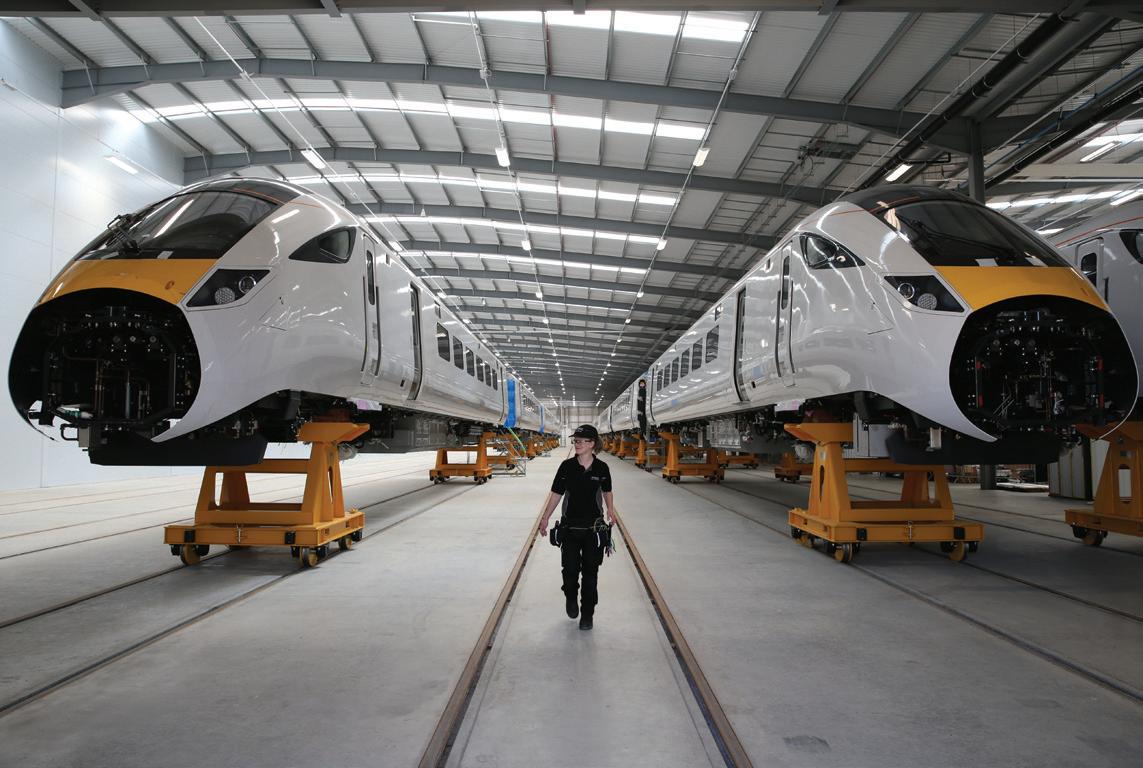
“With the last mainline order being over three years ago and no visibility of new orders for upgrading or renewing rolling stock in the UK, we are once again facing the prospect of job losses and factory closures,” said David Clarke, RIA technical director. “These closures would have a deeply damaging impact, with jobs, passenger satisfaction, value for money and the drive to decarbonise all undermined by the upcoming trough in the
WEST YORKS HS2 PROBE LAUNCHED
New study will assess Leeds and Bradford rail options
HIGH SPEED RAIL
The Department for Transport has initiated a comprehensive study to explore possibilities for operating HS2 trains to Leeds while also reevaluating Bradford improvements.
Following the government’s decision to abandon the planned eastern leg of HS2 to Leeds, the Leeds Study fulfills a commitment made in the Integrated Rail Plan (IRP) announced in November 2021.
The study, expected to conclude in 2025, will assess capacity at Leeds station and incorporate local perspectives, analysing the impact of different options on passengers, economic development, wider economic benefits, value for money, affordability, deliverability, and project timelines.
‘boom-and-bust’ funding cycle.”
In its report the RIA urges the government to take decisive action now, stressing that the consequences of inaction could be severe. It calls for immediate orders to replace or upgrade the oldest rolling stock. Notably, the RIA suggests that such orders do not require upfront public investment, as a private sector pathway exists for delivering new or upgraded rolling stock, with costs spread over time via the rolling stock leasing model. The benefits of these decisions are deemed significant, including preserving market competition, protecting UK skills and domestic
production capability, and enhancing passenger satisfaction.
Key messages from the report underscore the urgent need for decisions to avoid significant job losses and highlight the severe consequences of indecision. The RIA warns that running major parts of the passenger network using 40-year-old rolling stock is not sustainable and will lead to higher industry costs.
To prevent future order hiatus, the RIA proposes a long-term industry strategy for smoother upgrades and new builds while maintaining competition. This aims to boost confidence, drive productivity, and reduce life costs. The report also urges government to decide on rolling stock upgrades by the end of 2023.
Collaboration on high-level train specifications is also recommended and an ambition to phase out all diesel-only locomotives and multiple units from the UK network by 2040.
Network Rail will lead the technical work, supported by HS2 Ltd as needed. The study will expand on strategic alternatives considered for the eastern leg of HS2 in the IRP. It will also assess new platforms at Leeds station, their impact on dwell times and the timetable, and implications of HS2 trains on the broader network, including capacity considerations at Sheffield.
The government has also reaffirmed its commitment to upgrade and electrify the Bradford Interchange to Leeds line, targeting a 12-minute journey time within a decade. Evidence will be reevaluated to enhance Bradford’s connectivity, including potential for a new station, following the Transport Select Committee’s recommendation.
Rail minister Huw Merriman also acknowledged the recommendation to reassess St James’s Market station in Bradford. This reassessment will be integrated into the Northern Powerhouse Rail programme and the new study.
NEWS ROUND-UP 06 | 28 July 2023 www.passengertransport.co.uk
“We are once again facing the prospect of job losses and factory closures”
David Clarke, RIA
The last new UK train orders were placed over three years ago
Minister confirms privatisation plans
Operator of Last Resort contracts to return to private sector
CONTRACTS
Rail minister Huw Merriman has confirmed the government intends to return rail contracts that are currently operated by the Operator of Last Resort (OLR) to the private sector as soon as possible.
The admission came in response to a flurry of written questions from former rail minister and Blackpool North and Cleveleys
MP Paul Maynard querying government plans to return contracts under the control of the OLR to the private sector.
Maynard also asked Merriman whether there was a timeline in place for the transition of train operating companies’ contracts
AVANTI DEFENDS CLOSURE PLANS
RETAILING
More than 170,000 individuals have responded to the consultation on the proposed closure of over 800 station ticket offices in England, according to passenger watchdogs Transport Focus and London TravelWatch.
The figure was revealed as train operators this week unexpectedly extended the consultation period until September 1.
Meanwhile, Urban Transport Group (UTG) has argued that some of the planned changes lacked consistency. Notably, Manchester Piccadilly and Birmingham New Street, with over 32 million and 22 million annual
from emergency recovery measure agreements and national rail contracts to passenger service contracts, and whether there were plans to hold a market engagement day with potential train service operators.
In response Merriman said that once market conditions allowed it, the government intended to subject all contracts, both private sector and those under the OLR, to competitive tendering.
“We are working to develop new Passenger Service Contracts to enable a return to competition in the market to drive value for
money for customers and the taxpayer,” he added.
“As the secretary of state reaffirmed in the George Bradshaw address, we will enhance the role for the private sector as we deliver reform across the railways. Competition is essential to unlock the growth, innovation and efficiency that is required to create a sustainable model which delivers for railway customers.”
Merriman said that in the short term ministers and Department for Transport officials were working with the industry to introduce improved commercial incentives in existing contracts.
He continued: “We will consult with the market to develop and design the detail of these new contracts, before launching competitions in due course.”
AZUMA TESTS TO LIVERPOOL STREET
Alternate station may be used during disruption
NETWORKS
An LNER Azuma train travelled from Finsbury Park to London Liverpool Street during the early hours of July 14 as part of the initial stages to determine the long-term feasibility of diverting LNER services away from London King’s Cross to Liverpool Street during periods of planned disruption or significant engineering works.
TRAIN WI-FI STILL UNDER THREAT
users respectively, would lose their ticket counters under the plans, while offices at Leeds (19 million), Sheffield (7 million), Newcastleupon-Tyne (7 million), and Liverpool Lime Street (10 million) remained operational.
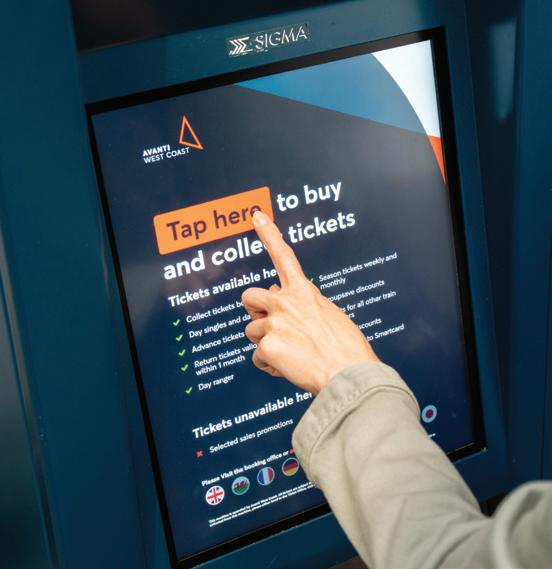
Avanti West Coast proposed the closure of all its ticket offices, including London Euston, Manchester Piccadilly, and Birmingham New Street, while LNER aimed to retain those at London King’s Cross, Newcastle-upon-Tyne, and Edinburgh.
Transport for Wales Rail Services plans no changes to the ticket offices it operates in England, covering stations like Chester, Shrewsbury, and Runcorn East. However, Runcorn, which had four times as many passengers as Runcorn East and is
operated by Avanti West Coast, is scheduled for closure.
Andy Mellors, the managing director of Avanti West Coast, has defended the plans. “It is important for the rail industry to change the way it retails tickets,” he said. “Our proposals would mean more staff on hand to give face-to-face help with a much wider range of needs.”
Rail
minister
confirms ‘case-by-case’ scrutiny
CONNECTIVITY
Rail minister Huw Merriman has confirmed that free Wi-Fi internet access on trains remains under threat in a bid to cut industry costs. Reports surfaced earlier in the summer that the government was considering instructing train operators to remove free passenger internet access unless they could demonstrate there was a business case for its retention. The proposals were criticised by both passenger groups and industry figures.
However, in response to a question from shadow business minister Bill Esterson, Merriman confirmed that the service could be scrapped.
“Our railways are currently not financially sustainable, and the Department [for Transport] has asked rail operators to provide the commercial case for retaining passenger facing Wi-Fi,” he said. “A decision will be taken on a case by case basis once the responses have been analysed by the Department. This assessment will also review the potential impact on passengers using train services for leisure, commuting and business.”
www.passengertransport.co.uk 28 July 2023 | 07
“We will enhance the role for the private sector”
Huw Merriman
Move comes as TOCs extend consultation
Avanti plans to close all ticket offices
“Competition is essential to unlock the growth, innovation and efficiency”
McGill’s probes options for night bus network
Move follows First’s decision to scrap city’s night bus network
EXPANSION
Expansion-minded Scottish bus group McGill’s has said it is to examine options for introducing night buses to Glasgow.
The move is in response to First Glasgow’s decision to withdraw all of its night bus network from August 20. The operator claimed it had made the decision as some buses were regularly operating with as few as 14 passengers per hour. The move will impact 11 routes that operate across the city in the early hours of Saturday and Sunday mornings.
Graeme Macfarlan, First Bus Scotland commercial director, said patronage figures suggested there was “not enough appetite in Glasgow” for services to operate into the early hours.
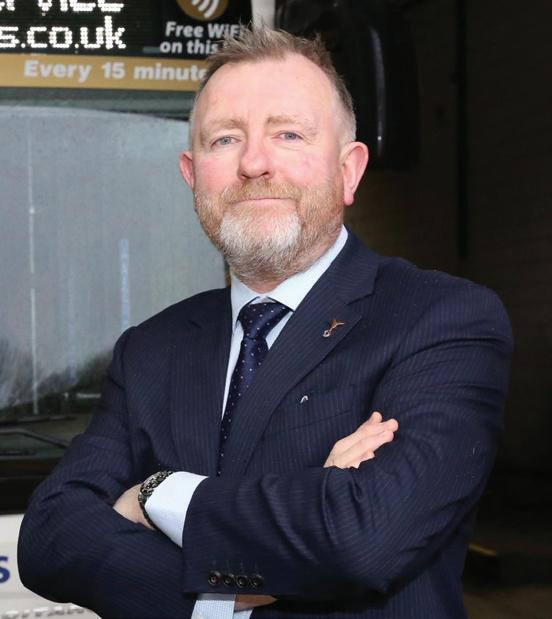
“Despite a wide variety of efforts by First Glasgow and
partner organisations to increase the number of people using the night buses, it has not reached the level required to sustain these services beyond July,” he said.
“To do so, we would require the number of people using them each weekend to treble overnight, which is not realistic.
“We really wanted to give these services every chance to succeed which is why we have absorbed the operating losses for the last 12 months.”
McGill’s has confirmed it is
examining the network but warned that the service must be financially viable.
“We are only at an initial stage of looking at what may be achievable,” said McGill’s chief executive Ralph Roberts. “The First Glasgow services that are being terminated are extensive and we cannot say at this stage that a like-for-like replacement will be feasible.
“That said, we know there is a level of demand for night-time bus services and if Glasgow is to thrive as a city, it needs companies such as McGill’s together with city leaders to see what we can achieve.”
McGill’s co-owner James Easdale added that with the demise of First’s network, publicly-controlled trains and the Glasgow Subway were not serving the needs of the night-time economy either. He continued: “There is an opportunity for buses to fill that huge gap and that’s why we’re keen to see what is possible.”
DRIVERS BACK 19.6% INCREASE
Lothian Country and East Coast staff back pay deal
INDUSTRIAL RELATIONS
Drivers at Lothian subsidiaries
Lothian Country and East Coast Buses are set to receive a substantial cumulative pay increase over two years that will uplift basic hourly pay by 19.6%.
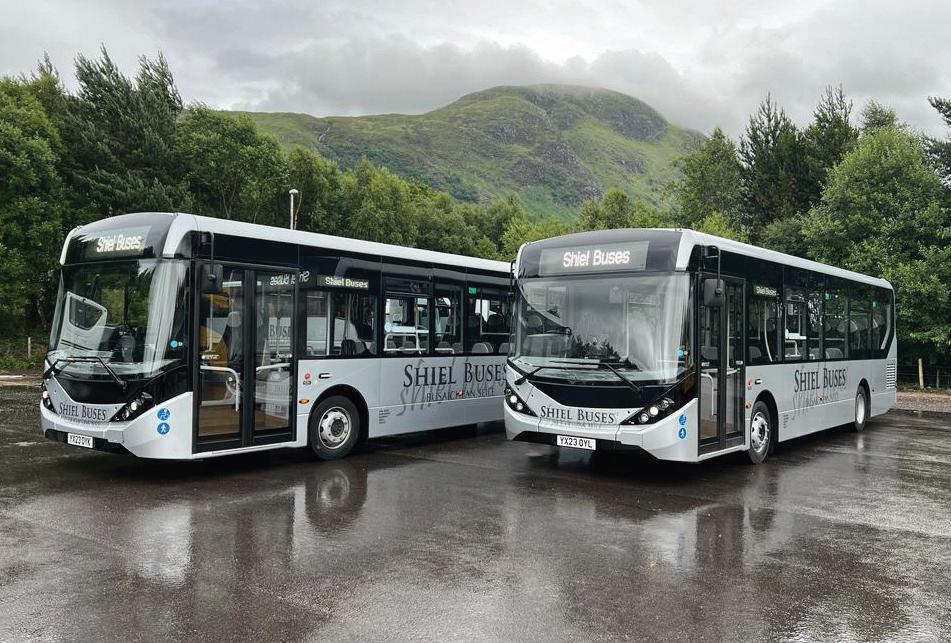
It follows negotiations where staff overwhelmingly backed the pay offer. The increase equates to a pay rise of around £5,100 for drivers working a guaranteed 39-hour week.
Unite general secretary Sharon
IN BRIEF
WARRINGTON’S ALBUM DATE
The ALBUM group that represents the UK’s municipal and independent bus operators has announced Warrington’s Own Buses will host the group’s 2024 conference at Carden Park in Cheshire on April 2224. The theme for the 2024 conference will be ‘Moving On Up’ and there will focus on the next stage the industry faces and the challenges and opportunities that this represents.
EDINBURGH’S FIVE STARS
Edinburgh Bus Tours has been awarded the prestigious five-star tourist attraction status from Visit Scotland. The Lothian-owned tour bus operator is the third most popular paid attraction in Scotland and Edinburgh Bus Tours has maintained its top score every year since 2011. Lothian MD Sarah Boyd said the status reflected “the passion, hard work and dedication of the whole team from our drivers, tickets sellers, tour guides to those working behind the scenes”.
Graham said: “The deal for Lothian Country and East Coast buses demonstrates the value of being in Unite. Our members have secured a significant wage deal over two years that will see an increase in hourly pay by 19.6%. It’s another great example of Unite driving up the jobs, pay and conditions of our members.”
In the first year, pay will increase by 14.2% taking the hourly rate from £13 per hour to £14.85 per hour along with a guarantee to deliver a 39-hour working week. The second year of the deal will see a further 4.7% rise on top of the 2023 pay rate taking hourly pay to £15.55 per hour.
NEWS ROUND-UP
Roberts confirmed McGill’s interest
08 | 28 July 2023 www.passengertransport.co.uk
SHIEL’S WHEELS Alexander Dennis has handed over another two Enviro200 single deckers to Fort William-based independent operator Shiel Buses. Around a fifth of the operator’s 50-strong fleet comprises Enviro200s.
Closing ticket offices creates challenges.
RAIB finds Lumo train almost overturned
Train passed through junction at three times permitted speed
SAFETY
A Lumo service from Newcastle to London King’s Cross was travelling at a speed where it almost overturned when it hit a junction at Peterborough station at three times the maximum permitted speed a report by the Rail Accident Investigation Branch (RAIB) has determined.
The data recorder on the train indicates it passed through Spital Junction at the northern approach to Peterborough station in April 2022 at 76mph when the maximum permitted speed is 30 mph reducing to 25 mph.
The speed of the train over the junction resulted in sudden sideways movements of the
PROSSER URGES MODERNISATION
REGULATION
Ian Prosser, HM chief inspector of railways, has called on the rail industry to focus on the impacts and risks of climate change, while continuing to improve the management of the health of its workers, in his annual safety report.
Prosser acknowledged the financial challenges confronting the railway, but he said that Britain’s rail network continues to maintain a high level of safety and performance compared to elsewhere in Europe. He also highlighted the importance of ensuring health and safety risks are comprehensively understood and
coaches. This led to some passengers being thrown from their seats and luggage falling from the overhead storage. Some passengers received minor injuries, half of them as a result of falling luggage.
The RAIB said that although the train did not derail, and no damage was caused, post-incident analysis has indicated it was likely that some of the wheels of the vehicles lifted off the rails.
The investigation found that the overspeeding was caused by the driver not reacting appropriately to the signal indication they had received on approach to the junction.
The RAIB found that Lumo had not assessed and controlled the risk associated with trains being unexpectedly routed on a slower, diverging route at this
addressed while the sector is subject to ongoing reform.
While he commended Transport for London (TfL) for securing a longerterm funding agreement with the government that will provide greater stability to its operations, Prosser warned that operational incidents, involving platform train interface risks, station asset management issues, including enforcement action taken as a result of a track worker safety investigation, continue to highlight “the importance of maintaining the focus on the day job”.
“The implementation of changes to staffing as part of the modernisation programme will continue to test the effectiveness of their safety management systems, in particular the change management processes,” he said.
location and that it had not adequately trained the driver to prepare for this eventuality.
Network Rail had also neither assessed nor effectively controlled the risk of overspeeding at locations where there is a long distance between the protecting signal and the junction itself.
RAIB has recommended that Lumo should review processes to control overspeeding at diverging junctions and minimise risks from falling luggage.
Network Rail has also been tasked to identify junctions with higher overspeeding potential and collaborate with operators to share risk-related information.
Meanwhile, Network Rail and train operators have been asked to implement risk control measures at those junctions identified in the latter recommendation.
Prosser’s report also highlights the role of technology and innovation in risk management and how it can play a part in eliminating risks. He also stressed the need for robust approaches to ensure the use of decision support tools, such as artificial intelligence and machine learning, in the rail sector.
His report also emphasised the need to improve incident investigations, adopt guidance on human performance, and manage fatigue-related risks. Prosser said the industry also needed to ensure adequate provision of facilities for staff, especially toilets.
He also warned that plans to reform European Union regulations post-Brexit needed to be carefully considered to avoid any potential unintended consequences.
IN BRIEF
EUROSTAR PAY DEAL
Directly employed Eurostar staff have secured a pay rise of between 8% and 17% depending on their grade and role, following negotiations between the RMT union and management.
All staff will get a minimum uplift of £4,300 for everyone on £45,000 or below. Other measures included within the package are increases in travel benefits, 100% basic pay for weeks 27-40 of maternity leave and support for bringing in greater digital services.
CHILTERN CLOSURE
Chiltern Railways services will undergo significant changes between August and October due to culvert repairs and HS2 construction work. A 12-day closure will address repairs to a Victorian drainage culvert at Aylesbury, impacting all trains between Aylesbury and Princes Risborough, as well as Aylesbury Vale Parkway and Amersham. Following that, from August 19 until October 30, services between Aylesbury and Princes Risborough will be affected by a blockade to accommodate the HS2 route beneath the existing railway.
HS2 PEOPLE MOVER
HS2 Ltd has launched procurement for its West Midlands Automated People Mover (APM) project. The APM will connect HS2’s Interchange Station, NEC, Birmingham International rail station, and Birmingham Airport. With a capacity of up to 2,100 passengers per hour in each direction, it will operate on a 2.2km elevated viaduct, crossing the NEC, West Coast Main Line, and M42 Motorway with a journey time of six minutes.
‘Technology can play a part in rail risk management’
www.passengertransport.co.uk 28 July 2023 | 09
Page 16
‘Bus is better climate investment than rail’
Lee Waters, Wales’s deputy minister for climate change, says buses and active travel beat rail on climate change credentials. Rhodri Clark reports
POLICY
A Welsh Government minister has said that investment in bus provides a better return in climate change terms than investment in rail, which is expensive and takes many years to deliver. However, his views have not yet influenced prioritisation by the government, which has reduced bus funding while continuing work on existing and future major rail projects.
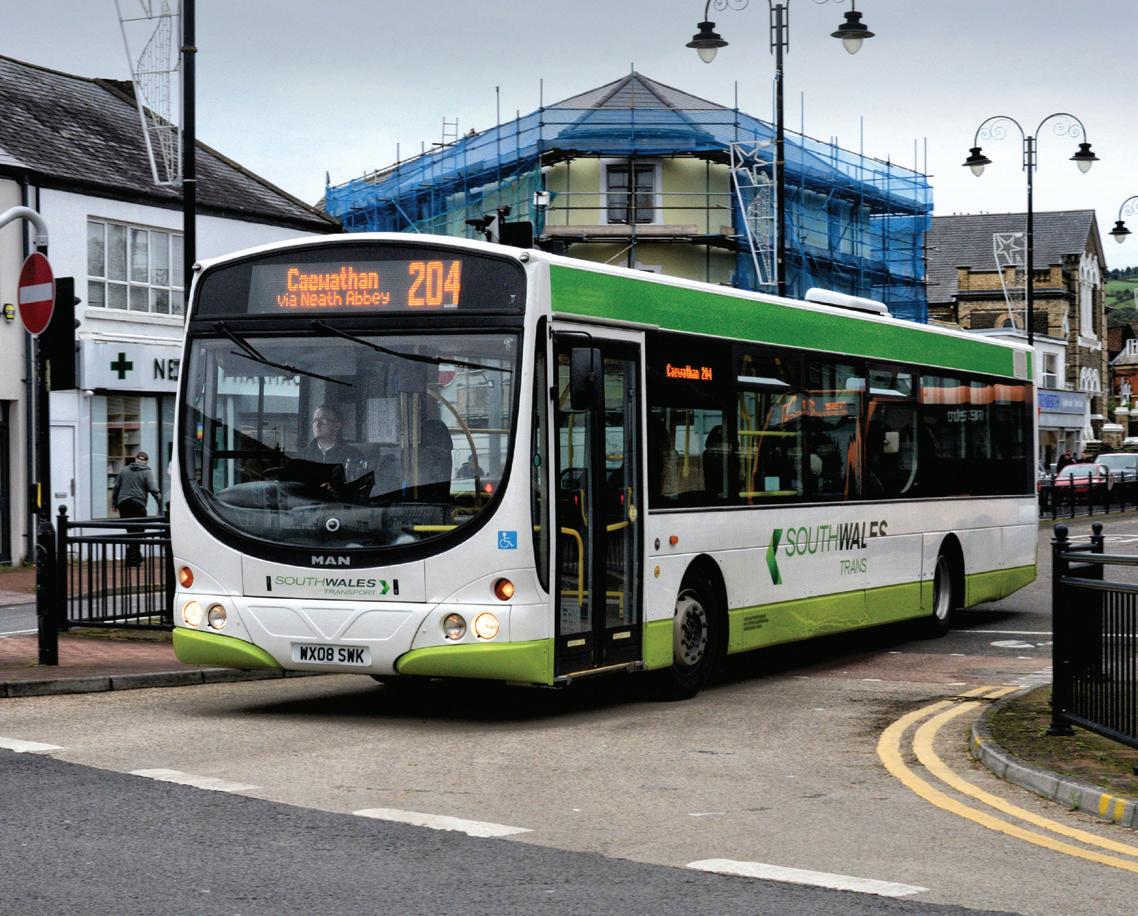
Lee Waters, deputy minister for climate change, gave a welcome address in Cardiff at the 55th annual conference of the Universities’ Transport Study Group. He spoke without a script and, when questions were invited from the floor, was asked why he had not mentioned rail.
“The amount of money that rail sinks in for the amount of carbon benefit it produces, I think needs to be challenged,” he said. “If our framing is: we are living in a climate emergency - we become inured to what this term means [but] it’s an emergency - and we have those tough carbon targets which are going to get harder and harder to meet, we should be challenging ourselves on what’s the best carbon return per pound spent, what can deliver us the quickest return on investment and the biggest modal shift.
“I’m afraid rail isn’t it. It’s probably bus, followed by active travel, but we’re locked in to rail spend because it has so many sunken costs. It’s very difficult to pull out from that, and then we are trapped into constantly
putting more money in. It carries a relatively small number of people, and because of the crazy privatised system we have in the UK where the passenger is expected to meet some of the costs of the running, the fares are high.
“In terms of social justice, in terms of gender, in terms of modal shift, I don’t think rail scores that highly, but there is a national obsession with rail.”
He said rail had a fundamental part to play for medium-distance journeys, but questions needed to be asked about how both modal shift and social justice could be delivered faster.
“One thing rail ain’t is quick,” Waters concluded. “Despite all that, we’re spending piles of money on it and we think it’s great.”
The government’s Transport for Wales company is currently modernising the Core Valley Lines, including electrification for tram-trains and tri-mode trains. Costs have increased from £738m to £1bn. This year the Welsh and UK Governments made £100m available for a new tram-train line linking Cardiff Central station to Cardiff Bay, and the Welsh Government is funding a £70m capacity enhancement on the Ebbw Vale
line. TfW Rail is introducing trains costing £800m, to ensure that 95% of Wales and Borders journeys will be on new stock.
Most of these commitments pre-date Waters’ time as transport minister, but TfW is now developing plans for a local passenger rail service on the Swansea District Line. Major investment would be needed to build stations along the line and install new track south of Neath. It would enable trains to connect Morriston and other places to Swansea, but with a long detour through Neath. The MorristonSwansea rail journey time has been estimated at 30 minutes, while buses run direct in 14 minutes and the car journey is estimated to take less than 10 minutes.
TfW also proposes a new railway station in Cockett, north Swansea. TfW told Swansea councillors last week that this rail enhancement package “produces a very, very positive case for investment”.
While rail takes up a growing share of funds, the new Bus Transition Fund, which covers the rest of 2023-24, is about £7m to £9m lower than the funding needed to maintain the current Welsh bus network. TfW and others are working on revised networks which would reflect post-pandemic travel demand and cost less to operate. In the meantime, operators are withdrawing more services, including several in Neath Port Talbot.
Signs are emerging, however, of TfW Rail curtailing its ambitions, at least for the near term. Last week it announced it would delay train service enhancements due in December and said: “We will also be reviewing longer term commitments to ensure they best meet the demands of customers and are fit for the needs of future generations.”
“The amount of money that rail sinks in for the amount of carbon benefit it produces, I think needs to be challenged”
Lee Waters, deputy minister for climate change
NET ZERO 10 | 28 July 2023 www.passengertransport.co.uk
Even before the Welsh bus network is scaled back to match the funding available, services are being withdrawn, including this one in Neath
Rural Zero Emission Buses Taskforce launch
Taskforce will focus
on how to keep rural services connected
DECARBONISATION
A new taskforce to help rural bus services smoothly and sustainably transition to zeroemission technologies has been convened by the Confederation of Passenger Transport. Without a clear roadmap to help operators decarbonise longer distance services in more remote areas and the end of sale date for diesel buses not yet confirmed, CPT is highlighting the need for action by bringing together industry leaders as part of a Rural Zero-Emission Buses Taskforce (RZEBT). It is chaired by Jeff Counsell, the former MD of Trentbarton and Kinchbus.
Over the last eight years, the bus sector has invested more than £2bn in Euro 6 and green bus technology and the government’s
LIBERTYBUS ELECTRIC TRIAL
Jersey operator tests
Mellor’s Sigma 8 bus
ZERO EMISSION BUSES
LibertyBus has been trialling Mellor’s Sigma 8 zero emission bus on Jersey this month. The Sigma battery-electric bus range includes six models, from 7 to 12-metres. Commenting on the trial, Kevin Hart, Director for LibertyBus said: “We are excited about trialling the electric bus on the Island. The Mellor Sigma range are great little buses and we can’t wait to trial the bus on the network and share the results of the trial with the Government of Jersey.”
ZEBRA scheme has also leveraged investment of £233m from the private sector. However, the current range of electric batteries and a lack of refueling and charging points on roads and in depots pose a significant challenge to operators in running longer distance zero-emission vehicles across rural communities.
“The road to zero presents many obstacles for all bus operators, however due to the extended range and topography of routes, our rural services face even greater challenges,” said Counsell.
“I look forward to working with stakeholders from across the bus, infrastructure and energy sectors to name a few, to develop a
strategy that will ensure our rural services can transition sustainably to zero-emission technologies and continue to provide the valuable service for passengers in more remote areas.”
CPT’s policy manager Becki Kite said: “Long distance rural bus services are vital for connecting passengers in more remote areas to work, leisure, education, and medical appointments.
“To help deliver a sustainable, fully funded, and long-term roadmap for operators in rural areas, CPT has set up a Rural Zero Bus Emission Taskforce with industry stakeholders and government to create a springboard of positive action.
“We are encouraging all interested stakeholders from operators, local transport authorities, DfT, energy and infrastructure providers who want to drive forward a better approach to rural bus service decarbonisation to sign up to the taskforce.”
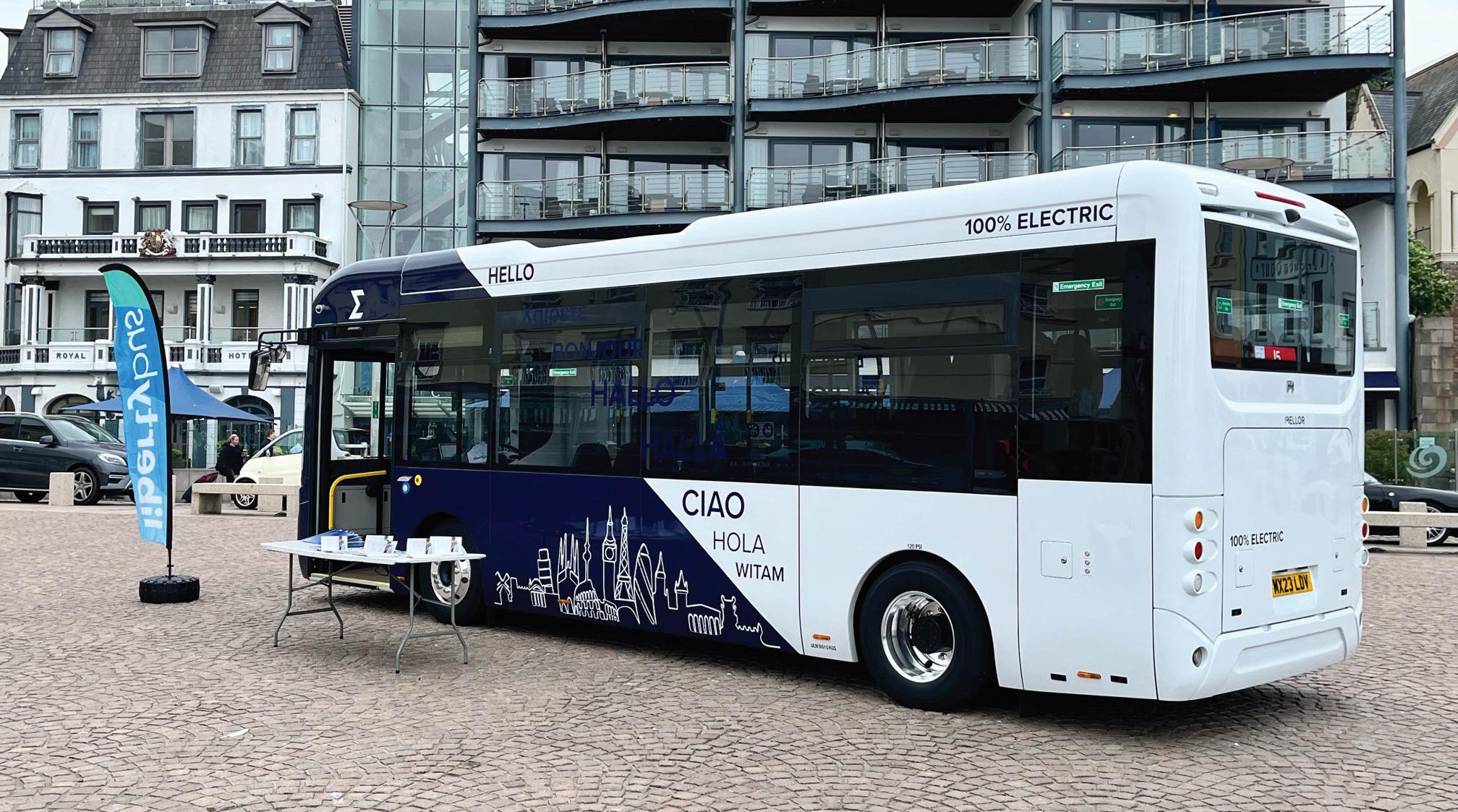
The first meeting of the RZEBT took place on June 29. Over the coming months, the taskforce will explore the decarbonisation challenges in rural areas. Using an evidence-based approach, it will then identify potential solutions to help operators overcome them. This approach will explore those limitations for the sector and there will be an important focus on how depot infrastructure improvements can be made to ensure better service from zero-emission vehicles.
CPT is inviting expert stakeholders to support the work of the Taskforce, which will involve bus operators, local transport authorities, DfT, energy and infrastructure providers.
For more information, contact Rebecca.kite@cpt-uk.org
“I look forward to working with stakeholders from across the bus, infrastructure and energy sectors”
www.passengertransport.co.uk 28 July 2023 | 11
Jeff Counsell, chair of RZEBT
The trial began on July 13 and will run for approximately three weeks
Bus sensors to monitor passenger comfort
BusMONITOR project is run through partnership between Innovate UK, Loughborough University and Vectare Ltd. Rhodri Clark reports
DATA
Bus operator Vectare is preparing to equip a vehicle with sensors to record a range of passenger comfort metrics, in a project which aims to create a commercially available monitoring system.
The project, named BusMONITOR (Measuring Operationally Needed Information Through Onboard Resources), is run through a Knowledge Transfer Partnership (KTP) which involves Innovate UK, Loughborough University and Vectare Ltd.
Metrics the vehicle sensors will measure include the vehicle’s location, speed, course over ground and onboard seated
REBRAND FOR EPM AND OMNIBUS PARENT COMPANY
BRANDING
UK-based EPM Transport Solutions, transport technology specialists and parent company of EPM Bus Solutions, Omnibus Solutions, 3Squared, and FabDigital has rebranded as ‘Velociti Group’.

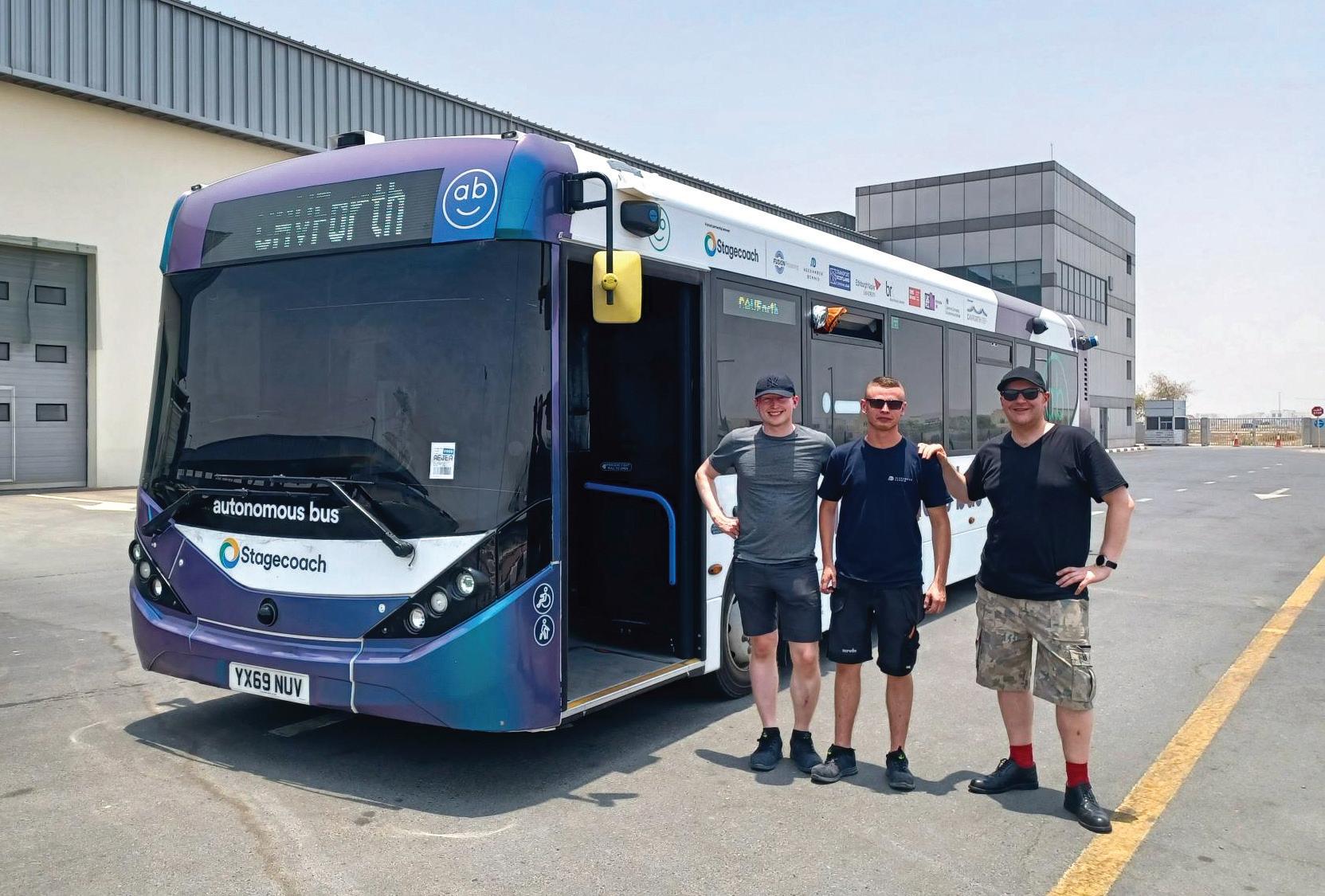
The company launched the new identity, including a new name and logo, to better communicate its purpose to deliver innovative software and specialist consultancy to power public transport. Along with the brand-new look, Velociti Group’s
occupancy, along with the interior temperature, humidity and barometric pressure. The system will also collect accelerometer data on ride smoothness, driving style, acceleration, braking harshness and steering harshness. Another strand of the project will involve checking the accuracy of systems which use satellite positioning to produce journey records. The project team will eventually add sensors for other metrics, including air quality and
passengers entering and exiting the vehicle.
Vectare was founded in 2016 and now operates services in several areas of eastern England, including Nottinghamshire, Leicester and Essex. Vectare engineer Dr Matt Beechey, who is managing the BusMONITOR project, told Passenger Transport this week: “We are hoping for the first pilot to begin in the next few weeks as we have successfully tested the system in small-scale
‘lab’ environment. Now the aim is to scale up that test and host it on an operating vehicle.”
Initially the sensors will be on a small vehicle, probably operating in Leicester. The team hopes to expand this pilot test in the autumn.
If the data gathering system does reach commercial viability, how would operators benefit from using it? “We hope operators benefit by firstly being able to monitor key indicators of comfort within their own services,” said Beechey.
“Unsurprisingly, research shows that increasing service quality increases ridership.
“Secondly, we hope it also benefits operators by forecasting future ridership. As we will store occupancy [data], we will be able to forecast this into the future, to allow operators to make decisions about fleet rightsizing and deployment.”
The data could also enable local transport authorities to ensure that operators are fulfilling contractual obligations, he added.
new brand message is ‘The Future. Accelerated’.
Ian Churchill, CEO at Velociti Group, commented: “We are delighted to launch Velociti Group, a new name and vibrant identity that effectively embodies us as a group ... Velociti Group companies will continue to operate as individual entities while the new group identity will bring them together as a collective, with the combined aim of creating a better future for forward-thinking organisations seeking to improve outcomes in rail and bus transport.”
INNOVATION & TECHNOLOGY 12 | 28 July 2023 www.passengertransport.co.uk
“We hope operators benefit by firstly being able to monitor key indicators of comfort within their own services”
Dr Matt Beechey, Vectare
GOODBYE DUBAI Bus builder Alexander Dennis has concluded on-track testing of an Enviro200AV autonomous bus in the 2023 Dubai World Challenge for Self-Driving Transport. Alexander Dennis and its technology partner Fusion Processing are one of just six automotive consortia globally that the Roads and Transport Authority (RTA) of Dubai shortlisted for the competition, which this year focuses on buses. The winner will be announced in September.
‘A new name and vibrant identity’
MTR UK venture seeks to optimise timetabling
Elizabeth Line operator teams up with longstanding partner
SOFTWARE
Elizabeth Line operator MTR UK has launched a joint venture agreement with Italian software and consultancy firm trenolab, initially aimed at helping Britain’s rail industry to optimise operations and timetable planning. The duo are seeking to improve customer journeys through a combination of powerful simulation technology and industry-leading excellence.
MTR trenolab’s customised solutions are based on a comprehensive offer including joint infrastructure and service planning, timetable robustness modelling and contingency and service recovery modelling. This leads to better planning,
NETWORK RAIL AND SBB SIGN AI AGREEMENT
Tech can help inspections of steel bridges and track
ARTIFICIAL INTELLIGENCE
Artificial Intelligence (AI) will be among the technologies that Network Rail and Swiss railway company SBB will be working on as part of an agreement signed by the companies this week.
The agreement, in the form of a Memorandum of Understanding (MoU), marks the first step by Network Rail to strengthen ties with international railway operators, sharing knowledge and best practice.
It is part of Network Rail’s newly formed International Research
more reliable services, and faster recovery times when trains get delayed.
MTR and trenolab partnered to drive improvements during the phased opening of the Elizabeth Line in London, conducting timetable modelling work to identify performance risks that could then be mitigated before each new timetable was launched. As a result, MTR Elizabeth Line trains had an average 94.4% punctuality during summer of 2022, compared to 87.6% for all London and South East operators. The relationship has now
evolved into a joint venture, that aims to offer similar expertise and improvements to the rest of the rail network.
Graham Cross, commercial director at MTR UK said: “Our partnership with trenolab, a company with whom we have a longstanding relationship and a great deal of admiration, is a hugely important milestone for MTR. As demonstrated on the Elizabeth line, we have seen first-hand the power their software brings to the rail sector when important decisions on timetable and infrastructure
specification need to be made.
“MTR’s involvement adds a deeper, practical knowledge of the rail industry to the technical excellence of trenolab. Together we aim to help clients drive significant improvements in punctuality and reliability across their operations, to benefit their passengers and freight customers.”
Giorgio Medeossi, technical director at trenolab, said:
“Our new joint venture with MTR UK will enable rail operators to elevate their service to customers by helping them create highperforming timetables and delivering efficient train services that run on time.”
MTR trenolab will continue to undertake timetable modelling work on Transport for London’s behalf for all changes to timetable specifications for the Elizabeth Line, informing decisions on future timetables and the impact of infrastructure design and system software changes, to ensure a high-performance railway that delivers for customers.
& Development partnership programme (IRDPP), which aims to deliver and develop technology to improve safety and deliver a network fit for passengers and freight customers. It will initially look at AI technology for use in inspections of steel bridges and track, specifically switch and crosses, and light-rail remote condition monitoring.
Robert Ampomah, Network Rail’s chief technology officer said:
“This partnership marks a major step for us as an organisation, partnering with the international rail community, to share experiences in operating a railway. Looking at what works and what doesn’t, will help us shape and develop innovative technology that will go towards modernising the railway.
“There has always been a
history of information sharing with rail colleagues nationally and internationally but signing the MoU today with SBB solidifies our commitment to work more closely together.”
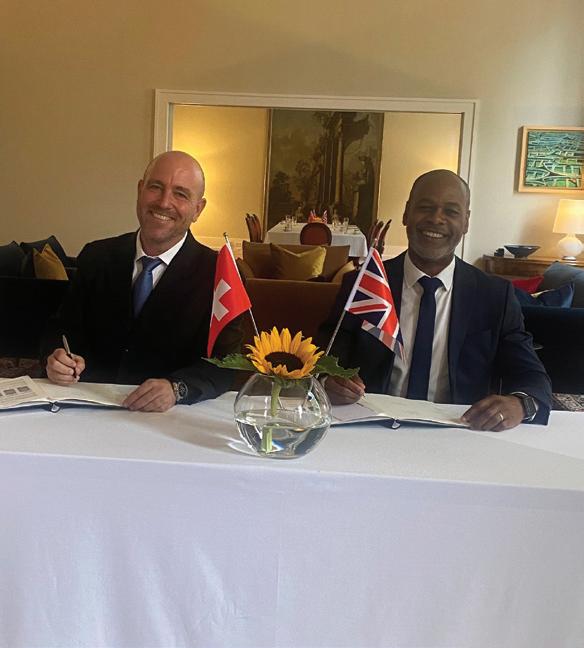
Roland Mosner, SBB’s head of technology, said: “It has been fundamental to us as an organisation
to continue to look forward in terms of sharing best practices and advances in applied research and development.
“By jointly improving our operational excellence we strive for the best returns for our passengers and customers. The signing of the MoU with Network Rail is one giant step in keeping the momentum moving in the right direction. We welcome the opportunity to collaboratively work with Network Rail and to share the positive outcomes this will bring.”
Projects developed as part of IRDPP will be jointly funded, with the responsibility for resources, testing capabilities, and best practices shared between both partiesinitially in the form of workshops both in person and online.
www.passengertransport.co.uk 28 July 2023 | 13
“Together we aim to help clients drive significant improvements in punctuality and reliability across their operations”
Graham Cross, MTR UK
A Memorandum of Understanding has been signed
NORMAN BAKER

Flights of fancy are fanning the flames
Aviation is becoming a real climate change problem but the government clings to the ‘jet zero’ fantasy. We need fewer flights
Many roams lead to Rhodes, and nobody is happier to facilitate these than the aviation industry. As Rhodes and much of the rest of Greece burns, holidaymakers were still blithely being jetted in to the furnace as late as this week.
I checked the British Airways website this morning, and it is very much business as usual where in Rhodes, you are tempted to “discover a Greek paradise”.
This paradise is currently suffering the worst wildfires the country has ever since, in 82 separate locations. Meanwhile the mercury in the thermometer hit 45C or 113F in old money. Thick plumes of smoke and orange skies blanket the island.

There is no doubt that man-made climate change is pouring petrol on the flames. Or is it kerosene? For there is also no doubt that emissions from aviation are a significant factor and increasing rapidly. Scientists predict that if the world heats by 2C, these brutal heatwaves and wildfires will happen every two to five years.
You might think, as the aviation industry blithely flies tourists into this vicious consequence of climate change, that they might show some self-awareness of their own contribution to the problem, but no.
They will concede, if pushed, that climate change is a reality and is linked to carbon emissions, but staunchly argue that nothing must get in the way of their business model. Yes, emissions will increase, but some other
unspecified sector can cut its emissions even more to enable net zero to be hit while aviation emissions grow. Wasteful, carbon-busting practices abound. One is the notorious habit of flying empty vast distances simply in order not to lose a slot at an airport. Another, revealed this week, is the request by Heathrow that planes flying into the airport should carry as much fuel as
possible so as to reduce demand on supplies on the ground. This significantly increases the weight of the plane and so its carbon footprint.
Overall the attitude of the aviation industry is one of selfish, irresponsible arrogance. But then for decades it has felt it can bend the UK government to its will, so has no real need to change behaviour.
In the middle of last year’s sweltering summer, the present government quietly issued its new aviation plan. This will allow the number of flights to soar by 70% between 2021 and 2050, representing an additional 200 million passengers. In true Orwellian fashion, this forms part of a “jet zero” strategy.
Nothing must get in the way of unrestricted growth in flights, but worry not because a magic wand will be waved and we will have zero-emission flights in the future. The fact that no such technology yet exists is glossed over. When pressed, the industry talks about so-called sustainable aviation fuels. The government is mandating that a minimum of 10% of jet fuel will have to be such by 2030.
They also aim for all domestic flights to achieve net zero by 2040 and for all airport operations in England to be zero-emission by the same year. Yet even under the wildly optimistic scenarios painted in the paper, the UK aviation sector will not reach net zero by 2050 but will still be emitting 19 million tonnes of CO2 equivalent at that point. Even the high-level ambition in the jet zero strategy has 2050 emissions higher than they were in 1990.
In 2020 international aviation made up 12% of the UK’s emissions from transport, a percentage that is likely to increase substantially in the future both due to greater passenger numbers and carbon reductions elsewhere.
Aviation is becoming a real climate change problem. It is not surprising that the Climate Change Committee has repeatedly highlighted the carbon threat from aviation and concluded that we need fewer flights, but that has fallen on deaf ears in government. Instead, they say that airline passengers should travel as they want and feel “guilt-free”. Indeed, the government says it “will continue to support sustainable airport growth”. Just what is sustainable about such growth, you might ask.
So it is therefore no surprise to learn of Gatwick Airport seeking to bring into regular use its second emergency runway. Its website calls this plan “a brighter future for everyone”
A forest fire in Rhodes. Scientists predict that if the world heats by 2C, these brutal heatwaves and wildfires will happen every two to five years
14 | 28 July 2023 www.passengertransport.co.uk COMMENT AVIATION
“Overall the attitude of the aviation industry is one of selfish, irresponsible arrogance”
and excitedly enthuses that “we could serve 75 million passengers a year by 2038 ... Let’s take off together.” Forgive me if I don’t get the champagne out.
Development is on the cards at London City, Manchester, and other airports around the country. Climate crisis? What crisis?
The Climate Change Committee is right. We need to fly less. Domestically, we should be switching passengers from air to rail, as is now happening in other European countries. Yet here, the Treasury has actually cut Air Passenger Duty for domestic flights, the only aviation tax there is, while seeing rail fares increase, up 5.9% last year, and inexplicably failing to bring in the Passenger Service Contracts promised in the Williams paper (Shapps has been quietly deleted). These would give the private operators an incentive to grow business and so grow the farebox, which is a much better way of reducing the cost of the railway than stupid ideas like cutting off the wi-fi on trains which would in any case save the square root of nothing.
The DfT’s impressive team of Mark Harper and Huw Merriman understand this and want to make progress, so you have to wonder why it is not happening. Step forward Rishi Sunak whose only interest in transport appears to centre round helicopters and private jets. Indeed, yet again this week, he was getting his chopper out for a trip from London to the
West Midlands, a journey of about 90 minutes by train.
Nor does the rail industry always help itself. We learnt this week in the papers that Network Rail bosses spent £10,000 a week last year on flights because it allegedly worked out cheaper than taking the train.
72 of the flights were between Birmingham and Glasgow, which has a perfectly good direct rail connection. If the people who run the railway won’t take the train, why should anyone else? Not-work Rail.
And are the flights actually cheaper or quicker? In a very detailed analysis issued last week by Campaign for Better Transport, the charity proved that on 60% of domestic routes, travelling by train was cheaper or the same as flying, and taking into account airport processing time, 70% of journeys were quicker by rail.
It might be added that you can of course work on the train. Try doing that in a security queue at an airport or squashed between two other people in a barely adequate plane seat.
The government, if it is serious about
POPULAR JOURNEYS WHERE OVERALL JOURNEY TIMES ARE FASTER BY RAIL
Source: Plane speaking: moving journeys from air to rail, Campaign for Better Transport
tackling climate change, should introduce a domestic flight reduction target, reverse the cut in APD, and indeed introduce a tax on fuel used on domestic non-lifeline journeys.
It should also introduce a new swingeing rate of APD, and introduce VAT on journeys made in private jets. It also needs to start penalising airlines who fly empty to protect slots.
The Civil Aviation Authority, which is actually reasonably progressive, should require airlines to state realistic journey times that take account of airport processing, and to give passengers a clear comparison of carbon emitted by air and the equivalent journey by rail where this exists. International flights are of course not often substitutable by rail, but airlines can at least help reduce the overall carbon footprint by providing free rail tickets to encourage passengers to use the train to get to the airport. Virtually all airports have pretty good rail connections.
Given that Network Rail chalked up 1,622 international flights last year, it might even get them on the train.
ABOUT THE AUTHOR
Norman Baker served as transport minister from May 2010 until October 2013. He was Lib Dem MP for Lewes between 1997 and 2015.
*Costsbasedonbookingeitheradirectflightortrainbetweentwoweeksandthreemonthsinadvance
**Journeytimesincludetravelto/fromtheairportandthecitycentreandtherecommendedairportprocessingtime
Flights between Plane Train Plane Train Plane Train LondonHeathrowandEdinburgh £60-300 £24.90-145.70 4hr40m 4hr20m 132.35 14.53 LondonHeathrowandGlasgow £42-261 £33.40-119.20 4hr45m 4hr30m 136.04 14.93 LondonHeathrowandManchester £40-400 £18.50-141.30 4hr30m 2hr6m 63.96 7.02 LondonGatwickandEdinburgh £25-104 £24.90-145.70 4hr45m 4hr20m 132.35 14.53 LondonHeathrowandNewcastle £47-332 £19.90-144.60 4hr40m 2hr37m 106.52 11.69 LondonCityandEdinburgh £75-266 £24.90-145.70 4hr45m 4hr20m 132.35 14.53 LondonLutonandEdinburgh £23-38 £24.90-145.70 4hr45m 4hr20m 132.35 14.53 BirminghamandGlasgow £23-48 £20.90-137.70 4hr45m 4hr05m 100.61 11.04 LondonCityandGlasgow £71-210 £33.40-119.20 4hr57m 4hr30m 136.04 14.93 BirminghamandEdinburgh £23-59 £20.90-146.80 4hr45m 4hr11m 97.91 10.75 LondonHeathrowandAmsterdam £77-406 £74-248 4hr30m 3hr52m 57.11 1.66 LondonHeathrowandParis(CharlesDeGaulle) £101-459 £49.50-215 4hr40m 2hr19m 53.43 1.55 LondonHeathrowandBrussels £74-302 £55-224 4hr35m 1hr53m 54.04 1.57
FULLJOURNEYTIME** CARBON EMISSIONS
COST(ONEWAY)*
(KG CO2e)
“Network Rail bosses spent £10,000 a week last year on flights”
www.passengertransport.co.uk 28 July 2023 | 15
ALEX WARNER

Closing ticket offices creates challenges
It’s seen as a quick financial fix, but the experience of the London Underground reveals the true cost of closing down ticket offices
A fortnight ago it was revealed that between December 2022 and May 2023, crime on London Underground had soared by almost 40% compared to pre-pandemic levels, despite there being 18% fewer customers. Fare dodging also hit record highs and the growth in crime was fuelled by a four-fold jump in robbery and a 68% increase in thefts. Crime on the bus network also rose by 19%.
I’m not remotely a criminologist so may be talking cobblers here, but I would surmise that what happens on public transport reflects the wider society - if there are more law-breaking then it is inevitable that it will also be our buses and trains. I would also suggest that Transport for London and transport per se hasn’t exactly helped itself. The RMT cites these unedifying statistics as an inevitable outcome of the closure of ticket offices and the shape of things to come if similar plans to do so on National Railcome to pass.
From my perspective, there were smaller stations where staffed ticket offices were insipid. In terms of their décor, they resembled cubby holes or unapproachable officescertainly lacking in anything you would find in a typical retail environment. They weren’t exactly magnets for customers to gravitate to in times of need. Quite often they had a soporific feel about them. On a lazy afternoon the staff would be hidden away in the messroom, half asleep with the radio on. However, for some hoodlums I would surmise that the presence of staffed ticket offices was
a mere deterrent in itself. I’ve worked in a few London Underground ticket offices and if you are observant and motivated, you can be very much the eyes and ears of the station. This is not just in real time, but over a prolonged period, finding out issues in the community and prevalent anti-social behaviour as well as identifying those nefarious individuals for the railway to keep a look out for. Ticket office staff forged close relationships with local BTP beat officers and were great informants. The closure of ticket offices at London Underground stations still rests uncomfortably with me. The so-called objective was to redeploy staff elsewhere, but from my personal anecdotes, the situation is worse. For several years, I ran a mystery shopping programme for Chiltern and the stations they served that were run by London Underground scored the lowest. At South Ruislip, the ticket office was rebranded as an Information Point. I lost track of how many times I knocked on the window, seeing two employees inside, facing away from customers, ensconced on their computers and refusing to answer queries. I felt sorry for Chiltern, whose brand was undermined by the pathetic management of the station by TfL. Elsewhere across London Underground,
I see no evidence of more visible staff now ticket offices have shut. In terms of revenue protection, it seems an entirely different epoque from the days when you would see the yellow-striped hats of a gaggle of gravitasexuding RPOs. You used to see them regularly, but I can’t recall when I last saw an RPO on London Underground. You also seldom see posters reminding customers of the need to buy a valid ticket and of the consequences, both personal and monetary of not doing so.
The concept of staff being redeployed elsewhere is a folly and the general public should not be railroaded during the consultation process relating to National Rail ticket office closures into believing this is going to happen. Well may there be no compulsory redundancies, but over time, natural wastage will mean that these mythical mobile roles would never be filled. The history of the railway is littered with situations where, under pressure, station managers chose to freeze recruitment of those platform or concourse vacancies that aren’t classified as ‘safety critical’. If they can get away with it, they will and in fact they will be lauded by their one-dimensional, bonus-hungry senior managers for doing so.
This fictitious roving role wouldn’t be a success even if it existed. Two words - human nature - will make a mockery of it and that is because, without a static sentry post, desk or office to be positioned within or behind, staff will revert to type and seek a place of retreat, or will just feel too insular to proactively approach customers in the way that us customer service protagonists dream of them doing. Standing on your feet for eight hours without a place to lean against or hide behind, in the glare of the public eye, is challenging, so too is conjuring up tasks of sufficient variety to sustain energy and genuinely add value.
I speak from recent experience. In June, I undertook two assignments that reinforced my view around the challenge. The first was helping out on a bus company’s display for two days at the Royal Cornwall County Show. It was during a hot spell of weather and I found it hard patrolling our large display area without the comfort blanket of a physical stand to position myself by and bereft of an explicit ‘to do’ list, apart from ‘keep people happy’. I felt inhibited and self-conscious standing up, not knowing where to look and who to make eye contact with. I’ll be honest, it didn’t take me
16 | 28 July 2023 www.passengertransport.co.uk COMMENT
“The concept of staff being redeployed elsewhere is a folly”
long to seek shelter in the tent which doubled up as the place where we stored our leaflets, doughnuts and cans of coke, and where we had our conflabs.
Back to TfL, and notwithstanding the ticket office closures, as a customer I’m not surprised by the creeping fare evasion and crime. I’ve seen more ticket office gates open than previously and a lot more folk tailgating or blagging their way through side gates. Partly driven by the prolonged funding issues and also in my view by the drain of experienced managers, stations haven’t looked as shoddy and grubby at any time since the Kings Cross fire in 1987.
It’s important that TfL and BTP and other authorities get a grip quickly as both perceptions of crime and the reality can spiral at pace - made worse now that we have TikTok and other social media platforms where incidents such as looting from shops and brawls are more generally recorded, glamourised and trivialised leading to copycat acts. It could be a long summer ahead, now schools and colleges have broken up.
I recall back in the late 1980s, when crime last felt a real deterrent to travel in London. Newspapers used to report rival gangs at each end of the Northern line meeting for fights and terrorising customers. Efforts to combat crime were also hamstrung by a BTP Control Room, which I worked in, and which was only slightly more advanced than the ‘security’ hut at many a non-league football ground.
The perception of crime and the reality isn’t much better on buses. In fact, I would admit to being more insecure on a bus in some parts of inner London than a train. This is partly because of the open nature of modern railway stock, such as that on the Elizabeth Line and London Overground, meaning you don’t feel cooped up in one confined space, literally on top of malevolent individuals. And you can get an early glance of danger and re-locate. Upstairs on a bus you feel exposed more to intimidating blaring from mobile phones, bad language and fights. You also tend to hear more about stabbings and muggings on buses.
The problem is that we have two situations playing out simultaneously and it’s the perfect storm. The funding issues for TfL, of which the ridiculous plan to kill off the Travelcard is one such effect, is giving a general impression of an organisation going backwards fast. This is occurring in tandem with rising knife, drug
and gun crime and anti-social behaviour in London, alongside a cost-of-living crisis that, in desperate times, can necessitate desperate responses such as habitual fare evasion.
TfL claim, almost with a sense of selfsatisfaction, that the figures are heightened by them encouraging folk to report everything. That’s a traditional explanation by police and other authorities to criticise the reality of statistics that suggest they’ve lost control. In truth, they would be better off admitting mistakes made and presenting a credible and determined plan to resolve the situation.
I don’t buy this argument that the panacea to financial travails is always to cut staff. For me, it’s a false economy - maintenance costs, particularly those relating to crime and vandalism, will increase, and how much revenue would be lost because there isn’t an enthusiastic employee promoting rail travel, advising on Railcards and other discounts that foster repeat travel and behavioural shifts towards public transport? How much income will not be gleaned because there isn’t anyone acting as the face of the station for stakeholders, often brokering partnerships, while senior management are absent, cossetted in their HQ offices or at home on Teams calls? Or, more importantly, what about just having a presence that reassures you and your family that it’s safe to travel?
These folk do more than just staff ticket offices and where gainfully deployed, their role extends to managing disruption through to school liaison. With the latter depleted, how many kids grow up today not knowing that one touch of the third rail means they are dead? The threat of terrorism also hasn’t gone away - how many vital snippets of intelligence have been supplied to the authorities from ticket office staff?
There are other ways to reduce the cost burden if we are to insist that the railway is primarily a business - HQ overheads, energy bills, fat cat bonuses, franchise bidding, service frequencies on some lines, overly long train formations, vanity projects, quangos, unnecessary investment in new rolling stock and so on. But those that are closest to the customer - the eyes, ears and ambassadors of rail in the community - why on earth would your default position be to get rid of them? I just don’t get it.
We would be better off re-designing ticket
offices so that they become beacons not just of the station but of the wider area - so few have a modern, presentable and prominently located retail demeanour about them. I’m not suggesting turning them all into convenience stores, but at each location, there’s a specific dual purpose that might be particularly suited to that specific area - coffee shop, tourist information hub, soft play centre, museum, arts and craft hub, community drop-in centre - anything is possible with vision, contacts and understanding the local market intimately.
Potentially, local entrepreneurs might invest in revamping and running ticket shops as social enterprises. Where this has been trialled before, there’s been some success, but the railway makes things difficult - volunteer organisations get ground down by not being supported in providing information around train services or being equipped to sell tickets or report faults and see them fixed effectively. There’s an opportunity to partner with communityfocused organisations, such as Co-Op or the Post Office, and get them to invest in and run groups of stations. They would need to be supported by a central department within GBR that provides them with the framework to do so, without being ground down by the notorious ‘you can’t do that’ culture that makes achieving anything in the rail industry complex.
Too many transport policy-makers fawn over Apps, QR codes, smart-ticketing pipedream gizmos and other tech just to feed their own narrative that they are in touch with the youth of today and the market of tomorrow. There’s an unfashionable counter argument; that relying on frontline staff in stations and those working in ticket offices may just have kept the railway ticking over the years. You don’t realise how good something was until you’ve lost it, and in the case of TfL, these crime figures were so utterly predictable.
ABOUT THE AUTHOR
Alex Warner has over 30 years’ experience in the transport sector, having held senior roles on a multi-modal basis across the sector. He is co-founder of recruitment business Lost Group and transport consultancy AJW Experience Group (which includes Great Scenic Journeys). He is also chair of West Midlands Grand Rail Collaboration and chair of Surrey FA.
“I
don’t buy this argument that the panacea to financial travails is always to cut staff”
www.passengertransport.co.uk 28 July 2023 | 17
COMMENT NICK RICHARDSON

War on the motorist – when do we start?
The populist media loves to make out that there is a ‘war on motorists’ to set various noisy factions against common sense, often to the detriment of passenger transport. Working on the basis that those who shout loudest must be right, the impression given is that somehow people with cars are hard done by because they can’t do everything they want all the time.
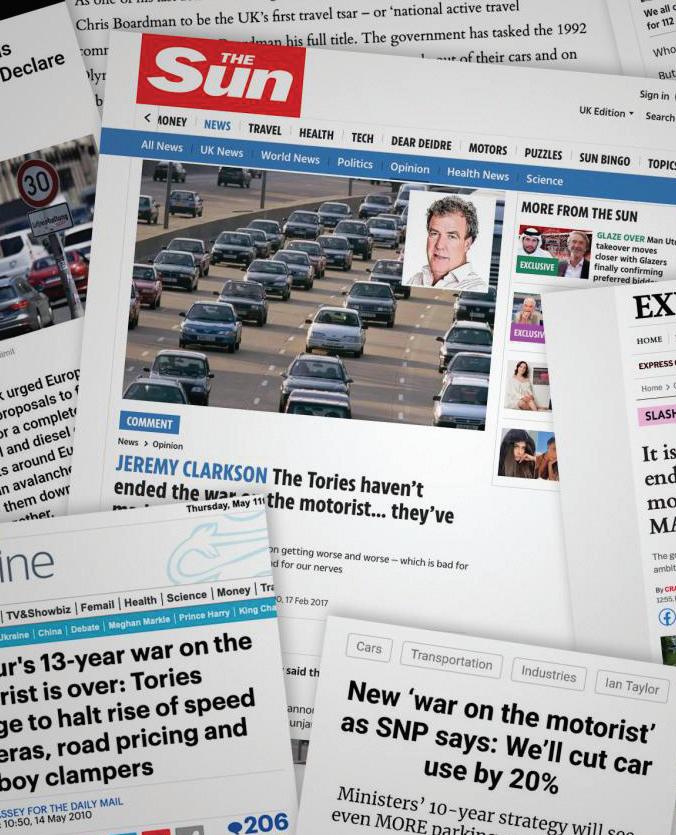
Failed experiment
This is evident from the complaints about traffic congestion, mainly from those who contribute to it because it affects them as individuals and isolates them from reality. Car use is excused by people driving their children to school because walking is dangerous, the irony being lost to them. The problem has been with us for decades and in many respects, it shows how promoting car use hasn’t worked well at all and we are now facing the consequences. Making out that there is a polarised issue is also misleading given that many car users walk, cycle and use buses, trams and trains for some journeys. Hence the fifty year experiment to promote motorised personal travel has been a failure and now is the time to challenge its legacy.
Evidence helps – traffic congestion blights communities and generates vehicle emissions, road safety is not yet where it should be, obesity is rife and other road users are discriminated against, not least those in buses that are delayed by cars. Not everyone uses cars but their interests tend to be excluded;
when motorists’ status is threatened, disorder results; Oxford’s Low Traffic Neighbourhoods were dubbed ‘antidemocratic’ but the elected representatives who promoted the schemes were re-elected recently so that argument proved to be baseless. The wider problem is that government has been promoting car use for decades. Even the chancellor keeps reminding us that energy bills and petrol prices are a problem, ignoring the fact that fossil fuel consumption by vehicles is not the way forward and contradicts so many other policies. It is shameful that the UK has failed to reduce car emissions because older vehicles have been replaced by larger, heavier ones.
Changing the emphasis
Much of this stems from a focus on personal mobility. The embedded aspiration is for car ownership among a majority of people although not everyone can afford it. There are stories of hardship in which individuals are forced into car use which they can ill afford because they have limited options available, reinforced by decisions about where they live (supported by creating housing at inaccessible locations) and in some instances, the demise of the transport services that they could use. Promoting motorised personal mobility is a hiding to nothing and the current policy of replacing petrol and diesel cars with electric cars doesn’t solve the problem, not least because it will never happen for reasons I have set out previously. Alongside this, any signs of managing demand are notable by their absence in what remains a highly consumerist society. Instead, the pendulum needs to swing towards mass transit, complementing unmotorised personal mobility. It seems incredible that we have to actively promote walking and cycling but that is the stage we have reached. Passenger transport options can meet much more of the demand to fulfil people’s daily needs.
Non-bus users
Transport Focus’ recent survey identified that 49% of 295 non bus-using respondents said that they would not use buses at all for any reason instead of a car: this could be regarded an under-estimate. Our deep rooted hatred of buses is hardly surprising and we know why - long journey times, irregularity of services, buses that don’t turn up, poor experiences personally or through hearsay, high fares and so on. Bus services are simply irrelevant to many people who have grown up with cars and can’t imagine anything else. What is perhaps more worrying is that 37% of former bus users in the survey were not at all likely to use the bus again. The pandemic reinforced their prejudices and some found that they could afford a car after all. In fact, traffic levels in some areas are higher than they have ever been, an appalling indictment of policy. Sadly, trains are heading the same way with absurd pricing and continual strikes which invite users to find other options.
Challenging this entrenchment is far from easy. However, a change in approach may be
With inappropriate policies and imminent climate disaster, we should be promoting passenger transport like never before
18 | 28 July 2023 www.passengertransport.co.uk
The populist media loves to make out that there is a ‘war on motorists’
helpful in not attempting to emulate cars but to provide new travel options. All too often we talk about bus services by presenting images of buses rather than what buses do i.e. provide journey opportunities for people. The national bus strategy for England document includes lots of pictures of buses which rather misses the point. We need a root and branch review of how passenger transport is presented and how it is viewed. Core values need to be rethought e.g. car use should not be the default option and it isn’t reasonable to expect trafficfree roads and all the trappings of cars such as air-con (wasteful), gadgets (distractions) and personal space. Some buses try to replicate this with leather seats (alienating anyone of a vegan persuasion) although individual seats are a distinct improvement. Other buses have tables and other features to attract users but getting them on the bus in the first place seems to be the problem. Service information needs to be available in a lively and comprehensible format and some services should be re-vamped to be more direct, quicker and include all those places where cars have the advantage such as out-of-centre business parks, employment areas and hospitals. Part of the equation is parking availability and pricing to dispel urban myths – councils are not profiteering because it costs money to manage the parking stock (and they are not allowed to profit anyway), without which chaos would ensue. It is not unreasonable to expect to pay for parking in premium locations especially where it can be avoided entirely by using passenger services.
Shared services

The societal dread of sharing needs to be overcome. Most places involve some interaction with other people - public open spaces, shops, workplaces, etc - so sharing space on a vehicle really shouldn’t be that difficult. The problem is an inbred one rather than a practical one, a by-product of a culture that values the personal space afforded by cars. Ironically, some car sharers would rather be doing something else such as children on the way to school who don’t want to be isolated in a moving box.
Meanwhile, the big issues need to be addressed. Recently government announced that the A303 diversion around Stonehenge will proceed, thus enabling car users to join the queue to the South West further on.
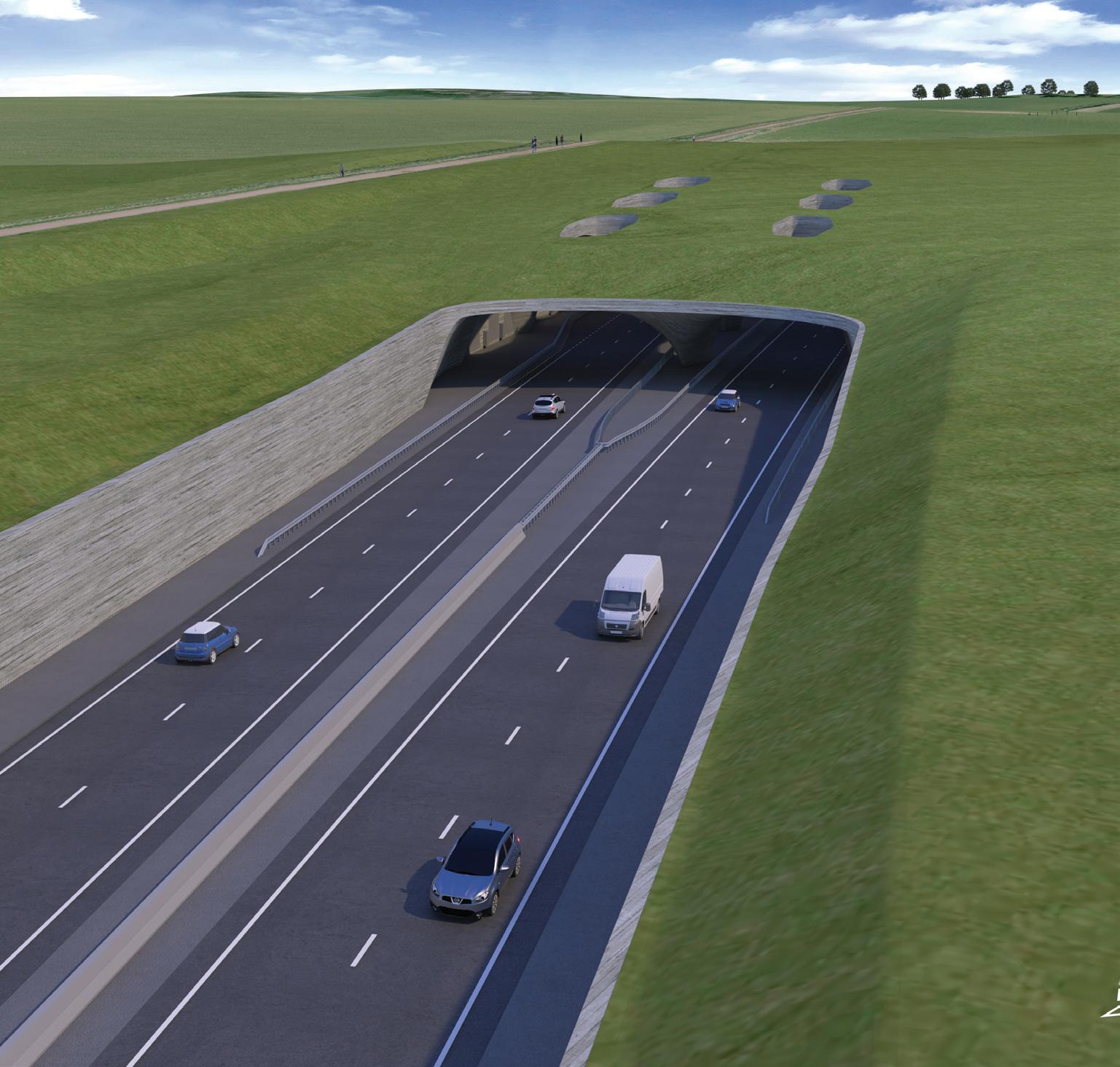
Contrast this with the situation we face of climate catastrophe and the need to decarbonise. Rebalancing public and private transport would mean shifting budgets to align with policy. Even a small proportion of the road construction budget would provide for the hoped-for transformational shift to bus and coach services. For the railway, vast sums have been spent to overcome decades of starvation and to upgrade the network to meet current and future needs despite trains accommodating a relatively small proportion of journeys. For bus services, there is a long way to go to improve the prospects for current and future users but in terms of value for public spend, the benefits are clear. The shift needed has to be led from the top because improving passenger services alone has limited impact - what is needed are some
push factors. A big issue is road user charging which, if deployed sensibly, is equitable and potentially favourable all round but it shows how politics has more of an influence than any amount of evidenced debate. Add to this coherent emission controls, consistent parking policies, sensible land use decisions and so on and we start to build a case for addressing excessive car use. It also requires proper levels of funding, a necessity in the case of the railway or franchised bus services; this is available if reallocated to align with policy. There really isn’t a case for perpetuating car dependency; now is the time to take a stance against it.
ABOUT THE AUTHOR
Nick Richardson is technical director at transport consultancy WSP and chair of CILT’s Bus and Coach Policy Group and is a former chair of the Transport Planning Society. In addition, he has held a PCV licence for over 36 years.
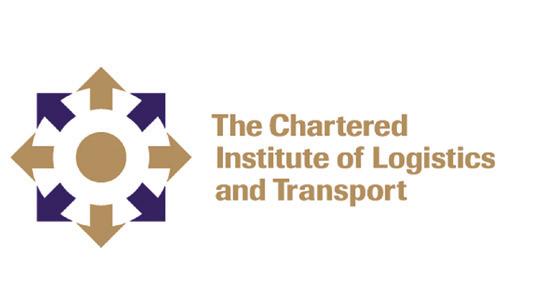
IN ASSOCIATION WITH:
01536 740100 @ciltuk
www.ciltuk.org.uk Tel:
“The societal dread of sharing needs to be overcome”
www.passengertransport.co.uk 28 July 2023 | 19
Recently government announced that the A303 diversion around Stonehenge will proceed
Advancing uptake of MaaS across Europe
Creating a more sustainable, seamless and inclusive mobility system with digital tools: over the last two and a half years, this has been the mission of the IP4MaaS project.
Under the helm of UITP (the International Association of Public Transport), the IP4MaaS project sought to advance the uptake of Mobility as a Service (MaaS) schemes in Europe, by analysing and testing existing MaaS technologies and solutions, and assess them in terms of effectiveness, market acceptance, and user satisfaction.
Strengthening rail as the backbone of mobility
Instead of developing new technologies, the IP4MaaS project tested solutions developed under the Innovation Programme 4 (IP4) of the Shift2Rail Joint Undertaking (Shift2Rail became ‘Europe’s Rail’ in early 2022). IP4 is a framework addressing and designing IT solutions for attractive railway services, with the ultimate aim of making rail the real backbone of the multimodal, door-to-door and seamless transport system of the future.
IP4MaaS’ main aim was to act as a “bridge” between the needs and requirements of Transport Services Providers (TSPs) and travellers, and the technologies developed within Europe’s Rail. Its challenge was to provide the individual IT solutions developed in Shift2Rail/Europe’s Rail projects, combining them into solutions suitable for specific demonstration scenarios in different European areas.
In its role as bridge between European TSPs and CFM (Call for Members - Partners from CFM Projects, created following a call for members amongst industry actors) technology providers, IP4MaaS had a key responsibility in making this link seamless. Therefore, mapping technologies was at the foundation to understand how to facilitate the co-operation for the best value for European citizens.
The project started with an analysis of the landscape from the travellers’ point of view, through a survey and a social media mining experimentation, resulting in a clearer picture of the needs and expectations of citizens with respect to mobility services and technological supports to their journeys. After, the mobility pain points for each demo site were identified, seeing how IP4 solutions could solve them. Finally, the actual integration of the TSPs in the ecosystem took place.
Six demos across Europe IP4 technologies were demonstrated in six European sites (Padua, Liberec, Barcelona, Athens, Warsaw, Osijek) involving different transport operators.
The tested technologies, like journey planning, trip tracking, trip sharing, are all brought together in the so-called Shift2Rail Travel Companion application, which was the
application passengers got to test.
In each demo site, different technologies were tested. In Athens, the demo focused on enhancing multi-modality by providing journey planning and integrated ticketing through a single app, involving several transport modes (metros, buses, taxis, bikes and walking).

While full results are still being assessed, first insights of the Athens demo showed that the overall feeling among passengers was very positive, as they were excited to know that attempts are being made to develop a step towards MaaS in Athens. However the demo assessment also highlighted significant challenges, mainly related to technological and legal aspects.
Other demos tested, among others, integration of e-car and e-bike sharing schemes into the public transport network (Osijek, Croatia) and tools that can be used on long international distances (Warsaw, PolandLiberec, Czech Republic).
“Collaboration was key in the IP4MaaS project: it allowed us to plan, execute and monitor our demos and furthermore was fundamental for the successful integration of the different transport service providers,” comments Giuseppe Rizzi, project manager, UITP, and IP4MaaS coordinator.
Conclusions
The project started with an analysis of the landscape from the travellers’ point of view
While results of the IP4MaaS demos are currently still being assessed, project partners achieved to provide the link to connect TSPs, travellers and their needs to the technologies developed within Shift2Rail. In its demos, the project involved both “traditional” and innovative transport modes, and tested the IT solutions developed within Shift2Rail with hundreds of users in different contexts.
These activities allowed the project to test the technology and get from real travellers and TSPs a direct feedback, allowing stakeholders to improve the ecosystem and making an additional step towards the achievement of Europe’s Rail ambition of affirming rail as the backbone of the (multi-modal) transport system in Europe.
MORE ONLINE
Curious to read about all demo results? Keep an eye out on IP4MaaS channels, where soon a full wrap-up report will be disseminated. For more information: www.ip4maas.eu
“Collaboration was key in the IP4MaaS project” Giuseppe Rizzi, UITP
SPECIAL REPORT IP4MAAS
Under the helm of UITP, the IP4Maas project tested intelligent mobility solutions for better mobility in cities across Europe
20 | 28 July 2023 Brought to you by PassengerTransport

Shedding light on the Dark Fleets
The so-called maritime ‘Dark Fleet’ is estimated to be made up of 1,000 ships. It now accounts for over 50% of Russia’s oil sales
Last month’s report highlighted that Russian exports of oil had actually increased since the invasion of Ukraine, thus highlighting the failure of Western sanctions. One of the key enablers of this unexpected surge in exports has come through the so-called maritime ‘Dark Fleet’, which now accounts for over 50% of Russia’s oil sales. Sadly, the shipping industry has never been much of an exemplar for scrupulous standards. From poor labour conditions, to eye-wateringly complex ownership structures - shipowners across the world have often excelled at operating beyond public scrutiny. Just look at the quite ludicrous ‘Flags of Convenience’ system, whereby over 40% of the world’s ships are registered with either Panama, Liberia or the Marshall Islands. This, to minimise legislative, environmental and legal burden in case of catastrophe. That isn’t to say that blue-chip fleets operating to the very highest standards don’t exist, but in an industry as fragmented as international shipping, there are far too many companies navigating in the shadows. These organisations have made perfect converts to the world of dark shipping.
The Dark Fleet itself is estimated to be made up of around 1,000 ships and this equates to around a tenth of the global tanker fleet. Even prior to the Ukraine invasion, ageing tankers - some over 50 years old - were
plying their trade to sanction-hit destinations such as Iran, Venezuela and North Korea. Iran itself has around 200 active Dark Fleet tankers and Venezuela has around 125. But since the invasion of Ukraine, the numbers of dark ships have surged and the fleet has doubled in size. Russian shipments account for the largest part of the Dark Fleet with over 600 ships (crude + product tankers) and it is estimated that this fleet now makes up around 80% of all opaque tanker movements. Sailing with their maritime transponders switched off, dark fleet vessels are almost impossible to track and trace. The vessels are frequently renamed and repainted whilst at sea and documents are constantly falsified. As efforts increase to monitor these ships, so does the counter-subterfuge from the ship owners. Dark Fleet vessels frequently engage in a new technique called “spoofing”, whereby military-grade software is used to manipulate AIS signals (transponders), thus disguising the ship ID, location and route. Other activities to avoid “capture”, involve the transhipment of liquid cargoes to another vessel mid-voyage. Such transhipments in open waters (rather than in sheltered anchorages and ports) are operationally challenging and present
tremendous environmental hazards. Spillages are common-place. A further tactic is to quickly land Russian product at busy (non-sanctioned) oil terminals, where the oil can be blended with “legitimate” oil and thus lose its Russian providence. This then allows exports of the oil as a non-sanctioned product. An example of this practice can be seen in Malaysia, where the country is managing to export twice as much oil as they actually produce - no prizes for guessing how this is being done.
Initial hopes to counter dark shipping activities were initially pinned on the insurance market, as prior to the invasion of Ukraine, 95% of the global oil fleet was insured by Protection & Indemnity (PI) Clubs in London. The thinking was that if insurance was withheld, then the illicit shipping would cease. After all, even the most reckless of operators would surely never take the risk of transporting millions of dollars of uninsured cargo? However, as soon as the London PI Clubs pulled cover (as part of the sanctions programme), new and shady PI clubs cropped up, almost certainly Russian-owned. These insurance outfits have of course never been tested in anger and how reliable they would be if (for example) a tanker ran aground in the Bosphorus, is anybody’s guess. But lucrative Dark Fleet shipping rates that many ship owners are seemingly willing to take the risk. Or worse, they are simply sailing without insurance cover at all.
This makes for a bleak and worrying picture. Here we have an aged and secret fleet, largely designed for short-sea shipping, but now carrying hazardous cargoes half-way around the world with inadequate (or no) insurance. It used to take 4-5 days to ship Russian oil from the Baltic ports to the Amsterdam-RotterdamAntwerp trading hub. Now it takes up to six weeks to sail to the new refining destinations of the Middle East, India and China. Perhaps this was always the inevitable result of the western sanctions programme, which were applied for the right reasons but seem to have worked for neither the oil trade, nor the shipping movements that go with it. Good intent does not necessarily equate to good outcomes and until there is a far wider global consensus on sanctions - that includes the operational sea lanes of West Africa, Malacca and the Black Sea - then the Dark Fleet will continue to sail and the ships involved may never come back into the light.
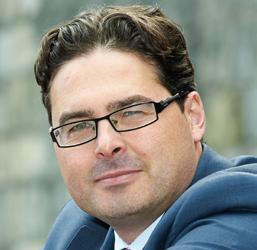
COMMENT WANT TO KNOW MORE? Visit Portland’s fuel forum page: portland-analytics.co.uk/fuel-forum
22 | 28 July 2023 www.passengertransport.co.uk OIL MARKET REPORT £ PORTLAND FUEL ANALYTICS - AUGUST 2023
James Spencer Portland
“This equates to around a tenth of the global tanker fleet”
GREAT MINSTER GRUMBLES

Do Labour’s rail policies make sense?
Our Whitehall insider imagines what’s going on inside the minds of the mandarins at Great Minster House, home of the DfT
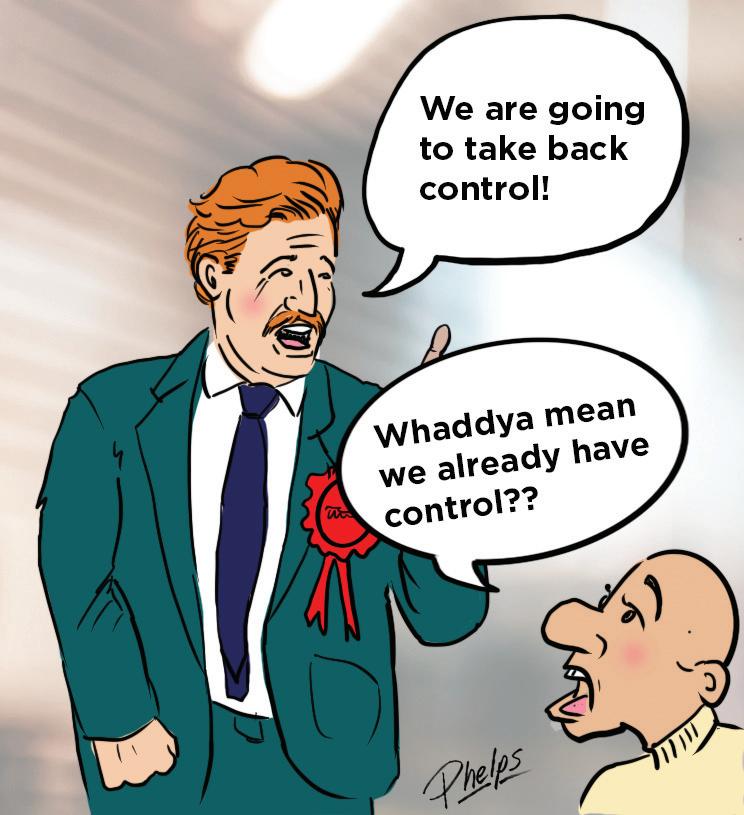
The results of the by-elections on July 20 suggest the Labour Party will win an outright majority at the next general election. So I’ve been reflecting on what public transport policy might look like under a Labour government. You might think the answer is obvious given that Labour has made clear that, for rail, it will bring all current passenger contracts back under public sector control; and for bus, it will make it easier for transport authorities to introduce franchising, while also allowing them to set up municipal companies.
What, you might think, is there to reflect on? Actually, a fair bit, I suggest. The first thing to ask is what does Labour really mean when it says it will bring all passenger contracts back under public sector control - because they are all effectively under public sector control already. The private sector simply runs passenger services under contracts drawn up and monitored by the government. Operators have little if any freedom, let alone incentive, to innovate to grow passenger numbers. Pretty much anything they do or propose has to be approved by this department. I think that’s called public sector control.
So what will be achieved by Labour bringing all passenger services ‘back’ under public sector control? How will this change the nature of the services currently on offer or change the performance of the railway? I can’t see how it will. As we acknowledged when we brought Northern Rail back into Directly Operated Railways, most of the factors impacting on
performance were outside the operator’s control anyway. For me, Labour’s position is little more than political posturing, although I totally understand the political factors that are driving this. The reality is that passengers won’t notice any difference as a result of Labour’s rail policies. The logos on the trains might no longer feature those nasty private sector company names, but little else will change. Labour doesn’t need to bring train services back under public sector control to achieve what it wants to achieve. To me, Labour’s policy here is nothing more than ideological, although from a political perspective that is both understandable and legitimate. But it won’t make any difference to service levels, performance, or the finances of the railway.
And here’s an interesting point. Under bus franchising, private operators are allowed to run bus services under contracts drawn up by, specified by, and enforced by public sector transport authorities. So if it’s OK for private companies to run bus services under a franchise model, why is it not OK for private sector companies to run rail passenger services under a similar franchise model? There seems to me to be something of an inconsistency here.
It’s hard to see what Labour will deliver by bringing passenger service contracts back under public sector control that is better than what is being delivered today. And it’s worth repeating that the majority of factors that impact on service reliability and therefore customer satisfaction are controlled by Network Railwhich is of course, er, a nationalised body - and not the nasty private sector train operators.
On a slightly different issue, the controversy over ticket office closures, Labour is confronted by a similar dilemma. I assume Labour is opposed to the proposed ticket office closure programme. But the consultation on the proposals that has been initiated by the Rail Delivery Group must, by definition, be fully supported and endorsed by Network Rail because both Andrew Haines, the Network Rail chief executive, and Jake Kelly, the group director for system operator Network Rail, sit on the RDG Board, as indeed does Robin Gisby, the chief executive of DfT OLR Holdings Limited. Now, it’s almost certainly the case that the RDG is acting under instruction from this department, and it’s also possible that a new Labour government would instruct the RDG to withdraw the ticket office closure proposals - an instruction that Network Rail and DfT OLR Holdings would have to respect.
But I would hazard a guess that Network Rail - that lovely cuddly nationalised bodysupports the ticket office closure proposals. The main objection appears to be coming from disabled people, and while everyone must be hugely sympathetic to their concerns, I’m not sure I fully understand them. Because how can somebody sitting behind a barrier in a ticket office actually help a person with a disability any more than if that employee was actually out and about on the station concourse and platform? In fact they can help more.
I have a hunch that a new Labour government might find its rail policies don’t make much practical sense.
COMMENT
“To me, Labour’s policy here is nothing more than ideological”
www.passengertransport.co.uk 28 July 2023 | 23
EVENTS THE GREAT TRANSPORT DEBATE
It’s time to collectively talk about transport
The Great Transport Debate is a unique event designed to bring together leaders, experts, innovators and 200 informed professionals from every sector of the industry to debate the most pressing issues and challenges facing UK passenger transport networks today - and in the future
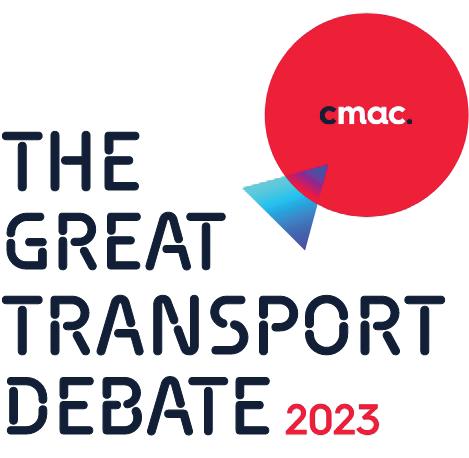
DATE Thursday 28 September 2023
TIME 10am- 5:30pm
The Great Transport Debate is being held at a time when all modes of transport, rail, aviation, and road, are an almost daily source of headlines, conversation and, in many cases, concern.
The problem for those of us who work in the transport industry is that when we do have a chance to get together and talk, it’s at industry-specific events in which the issues covered rarely stray beyond the bounds of the industry concerned. And the standard presentation plus 10-minute Q&A leaves little time for real debate.
Staying within industry boundaries makes it virtually impossible to debate the bigger, more strategic questions such as ‘what is preventing transport from being easier to access and how can we, collectively overcome this?’. Similarly, we can’t have a meaningful debate about ‘what’s preventing the UK from having a joined-up transport system?’ without the involvement of the different transport sectors that would have to work together to deliver an integrated, multi-modal
transport system that empowers passengers to reach their destination via the fastest, most reliable, and safest combination of methods.
Working for CMAC Group, an organisation that sits at the intersection of different transport industry sectors, allows myself and my colleagues to see transport challenges and issues from all sides, including that of the passenger.
We are very often the glue that binds the transport ecosystem together, usually at times of greatest need! In very simple terms, that’s the role we’re playing in sponsoring The Great Transport Debate.
The Great Transport Debate is designed to give transport industry professionals the time and space to debate the big issues amongst industry leaders, experts, and innovators from every mode of transport.
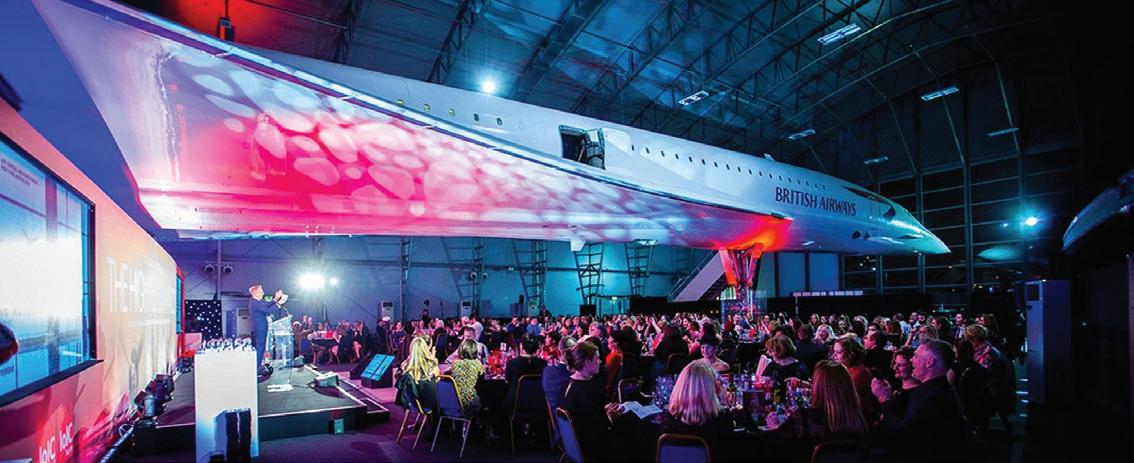
The event boasts a starstudded bill of six speakers and 16 panellists, each of whom will share insights and opinions honed by their personal experience.
Speakers include: Martin
Jones, CEO at CAVU; Nigel Stevens, chair at Transport Focus; Clive Wratten, chief executive at Business Travel Association (BTA); and Christian Schreyer, group chief executive at The Go-Ahead Group.
We’re very pleased to have Alex Hickman from Teneo, a strategic and communications consultancy, as a speaker. In March 2020, Alex became the prime minister’s special adviser on business. In this role, Alex worked closely with the prime minister and ministers during the Covid pandemic and built coalitions inside and outside government to progress the prime minister’s business priorities, including the net zero transition. All presenters and panel

members have been asked to be as informal as possible; to speak from the heart in sharing their experience, insights, and passion for transport.
The panellists include leaders from a wide range of transport and travel sectors including: Jacqueline Starr, Rail Delivery Group; Rachael Farrington, VisitBritain/VisitEngland, Simon McNamara, IATA; Jake Kelly, Network Rail; Clare Welsh, Wellman Cars & Taxi Alliance; James Hammet, UK Tram; Claudette Anderson, Go Jauntly, and our own Steve Turner, founder, and CEO at CMAC Group.
You can find details of speakers and panel members and book your tickets at: www. greattransportdebate.com
Without active audience participation, there won’t be a debate. We’re encouraging participants to interact throughout the event: asking questions, voting, and sharing their thoughts and opinions.
Tickets are limited to 200 - and they’re already going fast!
The Great Transport Debate offers a chance for professionals from all sectors of the industry to make their voice heard, engage in thought-provoking discussions, gain valuable insights, and network with influential figures in the transport sector.
I think we’d all agree that the passenger transport industry is at a critical crossroads, however, we believe that by coming together to share knowledge and insights as an industry collective at events such as The Great Transport Debate, we can, and we will, make transport better for passengers!
VENUE Concorde Conference Centre, Manchester Airport WEBSITE greattransportdebate.com
Neil Micklethwaite
ABOUT THE AUTHOR
Neil Micklethwaite is chief operating officer at CMAC Group
MORE ONLINE greattransportdebate.com
The venue: Concorde Conference Centre, Manchester Airport
24 | 28 July 2023 Brought to you by PassengerTransport

Thurston to step down
As project enters peak construction, HS2 CEO Mark Thurston will leave in September
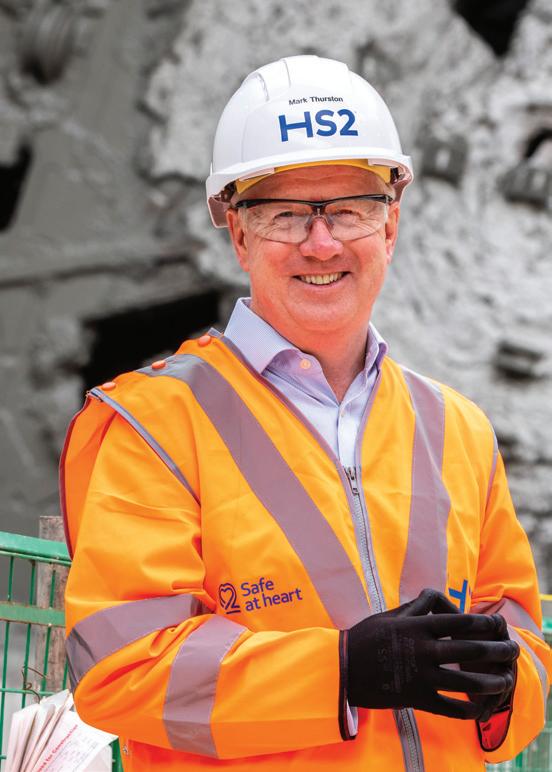
HS2 Ltd has announced that after six and a half years leading the organisation, chief executive Mark Thurston will leave his role in the autumn.
The first phase of Britain’s first fully domestic high speed line between London and the West Midlands is at peak construction and HS2 Ltd will soon begin to transition its focus and skills to railway systems, including signalling, track and power.
To ensure continuity through the coming years, Thurston will hand over to new leadership who will lead the transition to the next stage of the project.
“Leading this organisation has been the highlight of my career and a privilege from the first day - the programme has come such a long way and I want to thank everyone who has worked on the project during my time,” said Thurston.
“The next 18-24 months will see the project move into an
APPOINTMENTS
THE GO-AHEAD GROUP
C2C
exciting new stage. I have agreed with the Board that someone else should lead the organisation and programme through what will be another defining period for HS2.”
Thurston joined HS2 in March 2017, shortly after the organisation secured Royal Assent for Phase One, giving the powers to build the first section of the railway. He was instrumental in creating the project management framework for the delivery of Europe’s largest infrastructure project. In 2020 he secured the government’s approval to move into major construction works and fully mobilised a workforce which stands at 28,500 today, including 1,200 apprentices.
“I’d like to thank Mark Thurston for his work over the last six years progressing Britain’s most transformative rail project,” said transport secretary Mark Harper. “As well as successfully overseeing the start of construction, he has ensured HS2 has created tens of thousands of skilled jobs and apprenticeships across the country.
“As HS2 enters its next phase, the government remains committed to unlocking all the benefits of this flagship infrastructure scheme – increasing rail capacity, connecting communities and growing the economy.”
Thurston will leave HS2 Ltd at the end of September. Sir Jon Thompson will become executive chairman for an interim period while a new chief executive for the organisation is recruited.
The Go-Ahead Group has appointed Richard Harrington as group engineering director with responsibility for leading best practice in engineering across the company.
Presently engineering director at Go-Ahead London, Harrington (pictured) will move to Go-Ahead’s head office to take up his new role at the start of August. His position at Go-Ahead London will be filled by Chris McKeown, who is promoted from chief engineer.
Harrington entered the transport industry in 1984 as an apprentice engineer at London Transport. Over the course of his career at Go-Ahead London, he has been responsible for introducing London’s first dieselhybrid route, the capital’s first electric buses and Europe’s first all-electric bus depot. He is a fellow of the Chartered Institute of Logistics and Transport, the Society of Operations Engineers and the Institute of Road Transport Engineers.

ABELLIO LONDON
Abellio London has announced the appointment of Ian Sutton as commercial business partner.
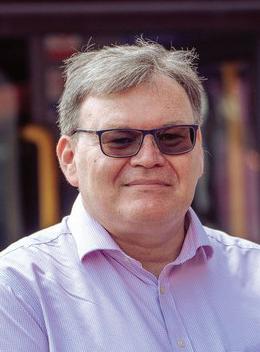
Sutton (pictured) joins from Arriva London where he led team within tendering, route performance, service quality, and profitability analysis.
Originally from Swindon, Sutton has held a lifelong interest in transport and he will report to Alastair Willis, Abellio London’s head of commercial. Sutton will work across Abellio’s six depots liaising with Transport for London.
Train operator c2c has announced the appointment of Eleni Jordan as commercial director.

Jordan (pictured) will join c2c in September from Chiltern Railways where she has served as commercial and customer strategy director for the past six years. In this role she was responsible for passenger and ancillary revenue and more recently, the post-pandemic growth strategy.
The appointment comes after c2c’s recent restructure, further supporting the operator’s increased focus on customers and communities. A key upcoming focus for the new commercial director will be the rollout of contactless pay-as-you-go ticketing across the East London and South Essex network.
Jordan succeeds Steve Knights, who has held the role on an interim basis. He will continue to work supporting commercial and business development activity within c2c and Trenitalia.
SYSTRA
Respected decarbonisation expert Romain Pison has joined SYSTRA’s UK & Ireland Consultancy division. Pison (pictured) joins the company as director of decarbonisation and will consolidate and expand its existing offering supporting public and private sector clients in achieving their Net Zero ambitions. At SYSTRA he will lead market growth in ESG consulting and advisory services, focusing on infrastructure, supply chain, and nature-based solutions.
 Mark Thurston
Mark Thurston
CAREERS 26 | 28 July 2023 www.passengertransport.co.uk CALL NOW TO ADVERTISE 020 3950 8000 or email sales@passengertransport.co.uk

Railway manager’s hair-raising kindness
Luscious locks to make wigs for cancer patients
A railway manager who’s gone without a haircut since before the first lockdown has had his locks cut off so he could donate them to make wigs for children with cancer.
Stuart Hughes, a senior programme manager for Network Rail in Birmingham, took his seat in the salon on July 14, the first time in over 41 months. His hair was gathered into 10 ponytails, 18 inches in length.

These are now being donated to
AN INTEGRATED TRANSPORT TRIP
The summer holidays just got a whole lot more exciting, thanks to Great Western Railway (s)teaming up with the Dartmouth Steam Railway and River Boat Company to offer a one-of-a-kind through ticket experience.
Sightseers can travel by GWR train to Paignton, before connecting with the steam train to Kingswear, and then the famous foot passenger ferry service to Dartmouth.
A very worthwhile integrated travel experience. Now if only we could do this the length and breadth of the country...
A BOOT-SCOOTING BUS ROUTE WALK
In an extraordinary feat of foot power, Neil Atherton has taken the humble walk to superhero levels. The MyDrive trainer has walked over 125 miles of Arriva
bus routes across the country in a bid to make strides for charity. So far he has raised over £6,000 for the Trussell Trust, and Neil’s total contributions stand tall at £17,000 over two years.

Joined by fellow Arriva colleagues, Neil trekked from north to south, braving rainsoaked days (looking at you, Hemel Hempstead) and clocking 279,993 steps. A true legend, he’s not just driving buses; he’s driving change, so well done Neil, the walking wonder with a heart as big as a bus!
DREAM COME TRUE
Well done to Arriva who made schoolboy Zac’s dreams come true. The 16-year old autistic boy wanted to travel to his school prom on his own private bus and Arriva Milton Keynes stepped in to ensure the teenage bus fanatic could go to the ball! Hooray!
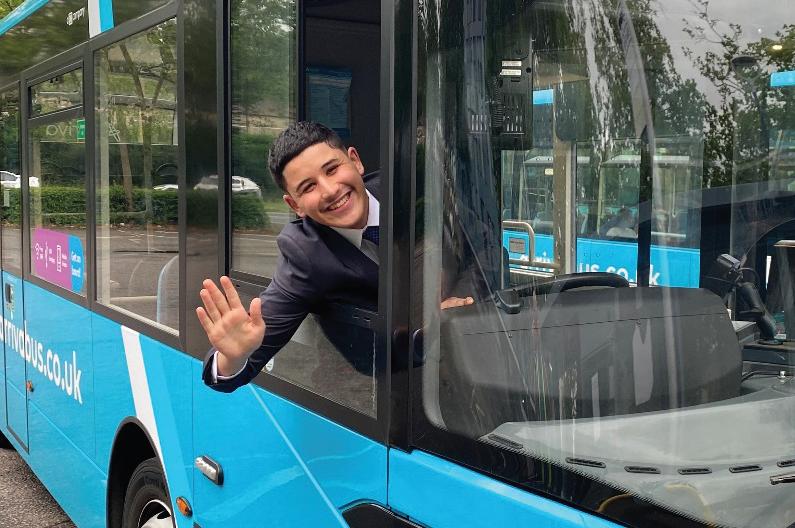
Looks
MORPH’S CLAYTASTIC CHAOS
Morph, the mischievous character from BBC’s Take Hart of the 1970s, visited Brighton recently on a day trip where he enjoyed the beach and pier.
He was on a mission to promote ‘Morph’s Epic Art Adventure,’ a wheelchair-friendly family art trail sponsored by Thameslink. The trail boasts 56 six-foot Morph sculptures across London, raising funds for Whizz Kidz charity.

So, if you spot a clay character making mischief on Thameslink, you know it’s Morph on a mission. However, we’ve have had no feedback on his thoughts about the Thameslink seats...
SEEN SOMETHING QUIRKY?
Why not drop us a line at editorial@passengertransport.co.uk
PT294
ORDER FORM
All annual subscription rates include delivery by secondclass post, or airmail for overseas. ANNUA L SUBSCRIPTION R ATES 1 year UK: £140 EU & Rest of World: £280 2 year UK: £250 3 year UK: £375 WWW.PASSENGERTRANSPORT.CO.UK N A M E JOB TITLE CO M PANY ADDRESS POSTCODE TEL E M AIL DATE PLEASE START MY SUBSCRIPTION TO PASSENGER TRANSPORT CARD NU M BER SECURITY CODE EXPIRY DATE SIGNATURE I enclose a cheque for £ made payable to Passenger Transport Publishing Limited Please invoice my company (official order enclosed) I authorise you to debit my M astercard/VISA/ M aestro/VISA Electron card. Amount £
SUBSCRIPTION
Email: subs@passengertransport.co.uk Return to: Subscriptions, Passenger Transport Publishing Ltd, PO Box 5496, Westbury BA13 9BX
bigger than we remember
Hereford-based charity The Little Princess Trust, which provides real hair wigs free of charge to children and young people undergoing cancer treatment or who have conditions like alopecia.
We think this is the before shot...
Getting a move on!
28 | 28 July 2023 www.passengertransport.co.uk
Zac’s on board with this plan
DIVERSIONS



 Managing Editor
Managing Editor
































 Mark Thurston
Mark Thurston




